Слайд 1Vocabulary The law and crime + Раздел Говорение С5
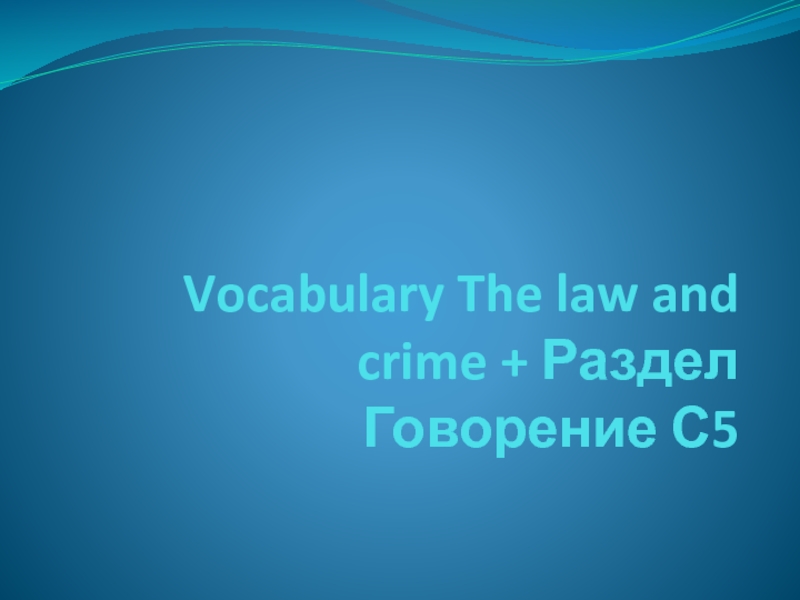
Слайд 24Раздел Говорение. Задание 41
Некоторые однокоренные слова, являющиеся разными частями речи, будут
читаться по-разному из-за различной постановки ударения. Вследствие этого, чтение определенных слогов тоже будет меняться, так как слог, который был безударным в одном слове, будет ударным в другом и наоборот. Например, вот эти слова:
Photograph /ˈfəʊ.tə.ɡrɑːf/ – фотография (ударение на первом слоге).
Photographer /fəˈtɒɡ.rə.fər/ – фотограф (ударение на втором слоге).
Photography /fəˈtɒɡ.rə.fi/ – фотография как искусство (ударение на втором слоге).
Photographic /ˌfəʊ.təˈɡræf.ɪk/ – фотографический (ударение на третьем слоге).
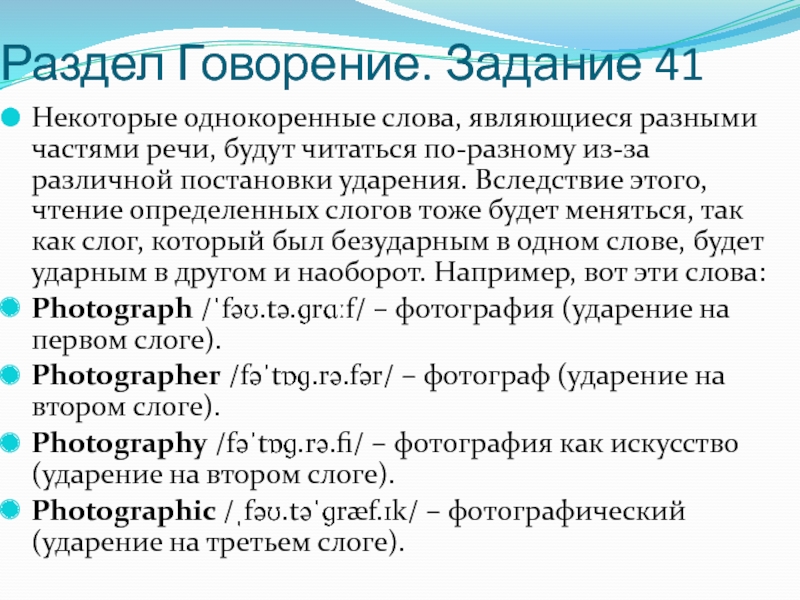
Слайд 25Раздел Говорение. Задание 41
Technical /ˈtek.nɪ.kəl/ – технический (ударение на первом слоге).
Technician /tekˈnɪʃ.ən/ –
техник (ударение на втором слоге).
Competition /ˌkɒm.pəˈtɪʃ.ən/ – соревнование (ударение на третьем слоге).
Competitor /kəmˈpet.ɪ.tər/ – соперник (ударение на втором слоге).
Compete /kəmˈpiːt/ – соревноваться (ударение на втором слоге).
Competitive /kəmˈpet.ɪ.tɪv/ – соревнующийся (ударение на втором слоге).
Politician /ˌpɒl.ɪˈtɪʃ.ən/ – политик (ударение на третьем слоге)
Political /pəˈlɪt.ɪ.kəl/ – политический (ударение на втором слоге)
Politics /ˈpɒl.ɪ.tɪks/ – политика (ударение на первом слоге)
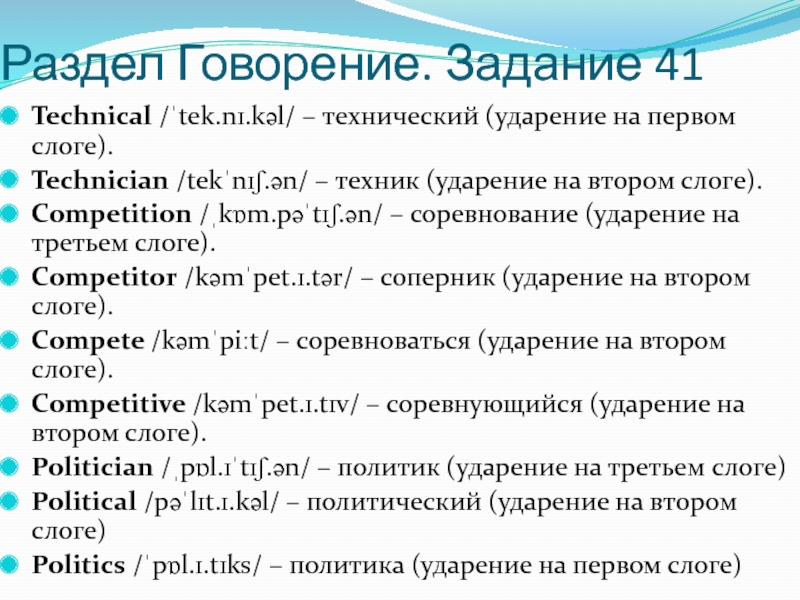
Слайд 27Раздел Говорение. Задание 41
Diana: What have you decided to do after
college, Jeremy?
Jeremy: I’m going to take up photography. Mr. McKenzie’s recommended the course at the Institute. He believes I could make a career as a photographer.
Diana: You’ll have to develop your own photographs. That requires technical skill. Jeremy, you’re not a technician! And photographic materials are very expensive.
Jeremy: Well, Diana, Mr. McKenzie thinks there’s a possibility I might win the Observer competition. I sent in four entries. All the competitors are amateurs, like myself.
Diana: I detest competitions. I never agree with the decision of the judges! I’m going to be a politician. I shall become the most distinguished woman on the political scene!
Jeremy: I thought you hated competing! Don’t tell me politics isn’t competitive!

Слайд 28Раздел Говорение. Задание 41
Ударение – это еще один не менее важный
аспект английского произношения. Так как часто неправильная постановка ударения может приводить к неверному пониманию слова. Все должны помнить, что числительные с 13 по 19 в английском языке произносятся с ударением на последний слог -teen (13 – /θɜːˈtiːn/, 15 – /ˌfɪfˈtiːn/, 19 – /ˌnaɪnˈtiːn/). А в десятках ударение стоит на первом слоге (30 – /ˈθɜː.ti/, 50 – /ˈfɪf.ti/, 90 – /ˈnaɪn.ti/). Часто пренебрегая этим правилом, мы ставим ударение на первом слоге и в словах с 13-19. Попробуйте быстро проговорить сначала 13, а потом 30. Вы увидите, что в потоке речи, последний слог у слов с 13-19 просто «съедается», его не слышно. И получается, что человек слышит не 13, а 30.
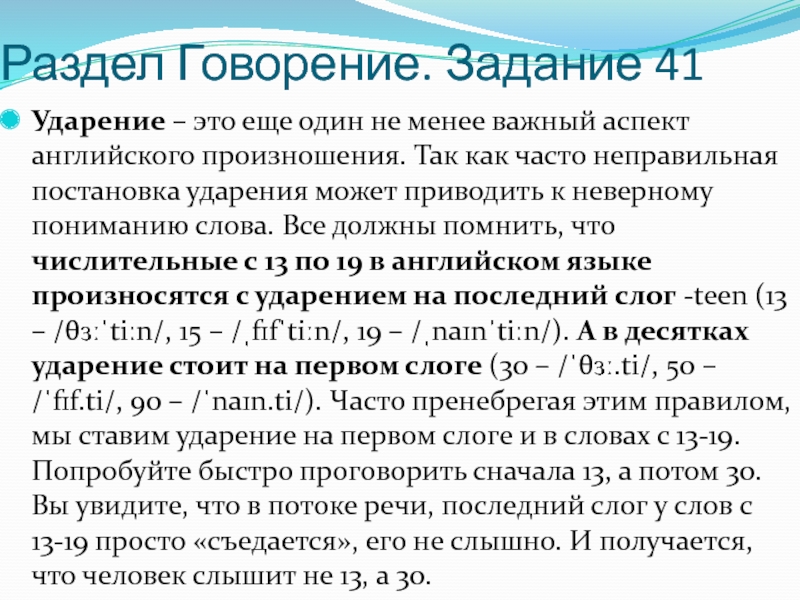
Слайд 29Раздел Говорение. Задание 41
Anxiety /æŋˈzaɪ.ə.ti/ – тревога – сбивает с толку чтение
однокоренного прилагательного /ˈæŋk.ʃəs/, поэтому слово anxiety пытаемся уподобить его произношению.
Chaos /ˈkeɪ.ɒs/ – хаос – велико желание произнести его на русский манер «хаос».
Choir /kwaɪər/ – хор – интересное произношение, которое не удается угадать без словаря.
Comfortable /ˈkʌm.fə.tə.bl̩/ – удобный – влияние русского языка не проходит бесследно в отношении этого слова, поэтому ударение «гуляет» по слогам.
Draught /drɑːft/ – черновик – проводим аналогию с чтением буквосочетания aught /ɔːt/, но это неправильно.
Height /haɪt/ – высота – произношение этого слова не похоже на произношение цифры 8.
Hyperbole /haɪˈpɜː.bəl.i/ – гипербола – произношение приходится просто запоминать наизусть, как и у многих других слов английского языка.
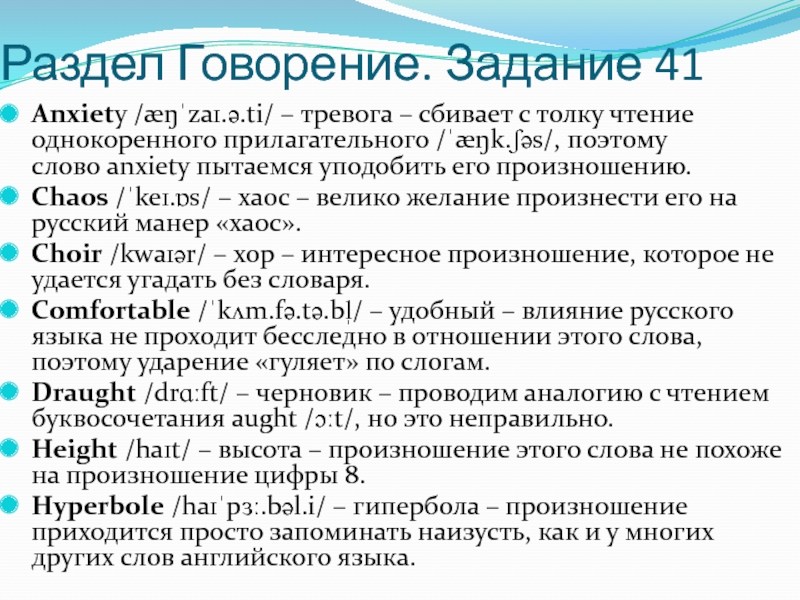
Слайд 30Раздел Говорение. Задание 41
Infamous /ˈɪn.fə.məs/ – позорный – автоматически пытаемся прочитать так
же, как и слово famous /ˈfeɪ.məs/.
Island /ˈaɪ.lənd/ – остров и aisle /aɪl/ – ряд – пока не выучим эти слова, продолжаем читать их как /islənd/ и /isl/.
Lieutenant /lefˈten.ənt/ – лейтенант – всегда хочется прочитать первый слог /ljʊ/, а получаем сюрприз.
Opposite /ˈɒp.ə.zɪt/ – противоположный – часто произносим неправильно третий слог /’sait/, там же ставим и ударение.
Probably /ˈprɒb.ə.bli/ – возможно – переносим ударение на второй слог, добавляем гласные в конце слова.
Queue /kjuː/ – очередь – встретив это слово однажды, придется поработать со словарем.
Recipe /ˈres.ɪ.pi/ – рецепт – читаем второй слог как открытый /saip/, потому что ошибочно ставим там ударение.
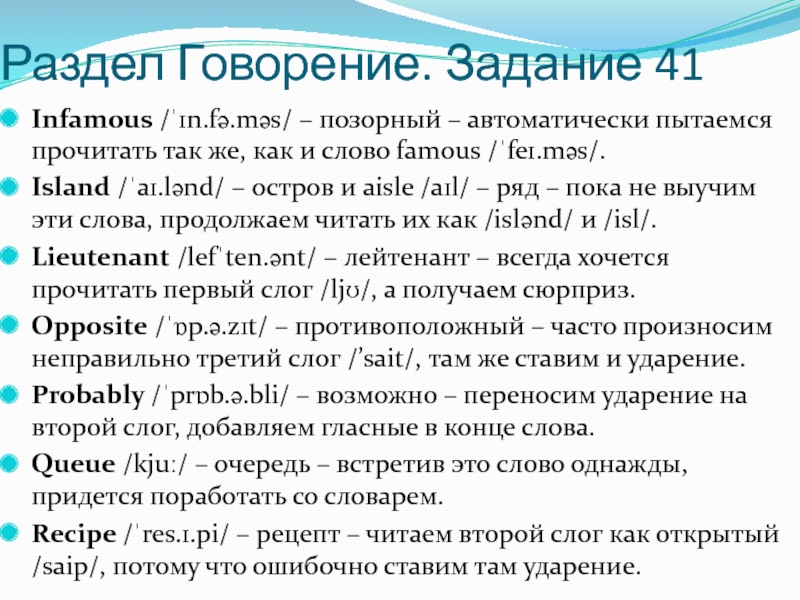
Слайд 31Раздел Говорение. Задание 41
Superfluous /suːˈpɜː.flu.əs/ – избыточный – пытаемся произнести первую часть
слова /super/.
Thesaurus /θɪˈsɔː.rəs/ – тезаурус – употребляемое русское слово «тезаурус» мешает правильно произнести это слово.
Through /θruː/ – через – стремимся прочитать почти все буквы в этом слове, а этого делать не надо.
Threshold /ˈθreʃ.həʊld/ – порог – стремимся прочитать это слово, как сочетание двух отдельных thres+hold, поэтому теряем звук /ʃ/.
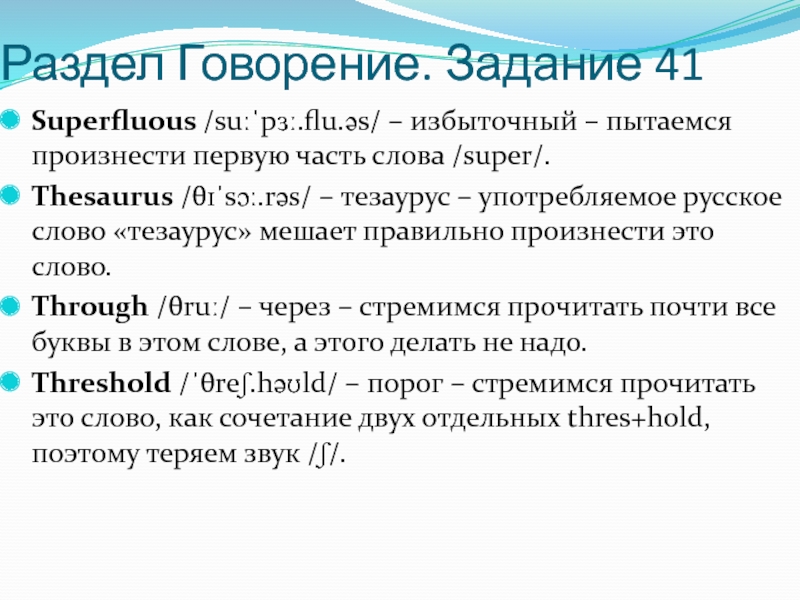
Слайд 32Раздел Говорение. Задание 41
Особые трудности в произношении также вызывают слова, имеющие
в своем составе немые буквы, которые не читаются. Например:
Answer /ˈɑːn.sər/ – ответ.
Debt /det/ – долг.
Honor /ˈɒn.ər/ – честь.
Honest /ˈɒn.ɪst/ – честный.
Receipt /rɪˈsiːt/ – чек.
Salmon /ˈsæm.ən/ – семга.
Subtle /ˈsʌt.əl/ – тонкий.
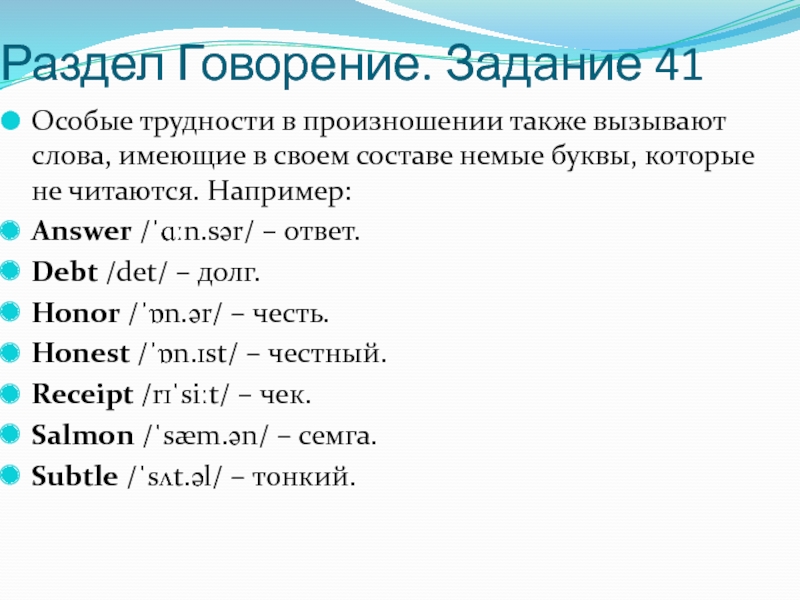
Слайд 33Раздел Говорение. Задание 41
И, конечно, не так легко справиться с прочтением
слов, состоящих из нескольких слогов.. Длинных слов в английском языке немало. Чтобы научиться их правильно читать, придется произнести несколько раз. Потренируйтесь читать эти слова:
Aluminium /ˌæl.jəˈmɪn.i.əm/ – алюминий.
Anesthetist /əˈniːs.θə.tɪst/ – анестезиолог.
Hereditary /həˈred.ɪ.tər.i/ – наследственный.
Prioritizing /praɪˈɒr.ɪ.taɪziŋ/ – определение приоритетов.
Pronunciation /prəˌnʌn.siˈeɪ.ʃən/ – произношение.
Provocatively /prəˈvɒk.ə.tɪvli/ – провокационно.
Remuneration /rɪˌmjuː.nərˈeɪ.ʃən/ – денежное вознаграждение.
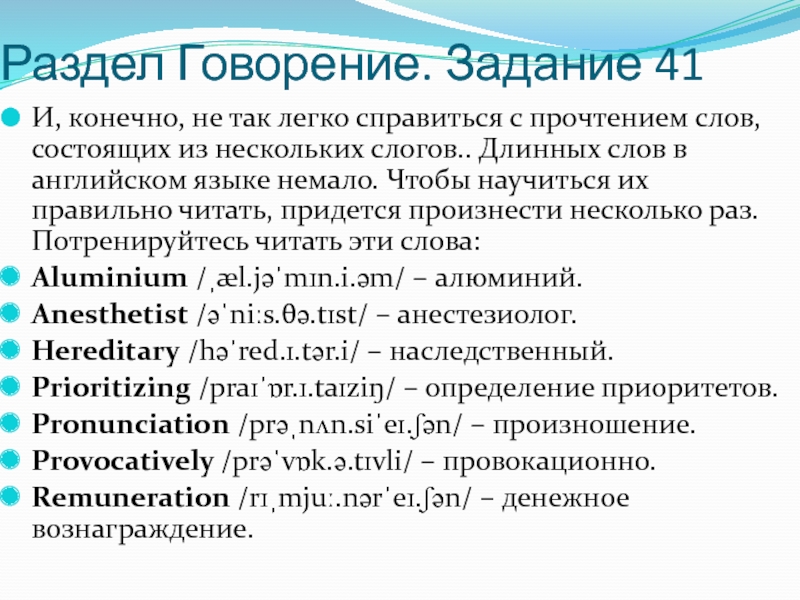
Слайд 34Раздел Говорение. Задание 41
Правила интонации в английском языке с примерами
Повышение тона
в английском языке
Обычно в интонации в английском языке тон нужно повышать, чтобы показать свою заинтересованность, недоверие, скептическое отношение, вежливость. При этом вы меняете интенсивность голоса, чтобы передать свои чувства и смысл сказанного, например:
↗Really? — Действительно?
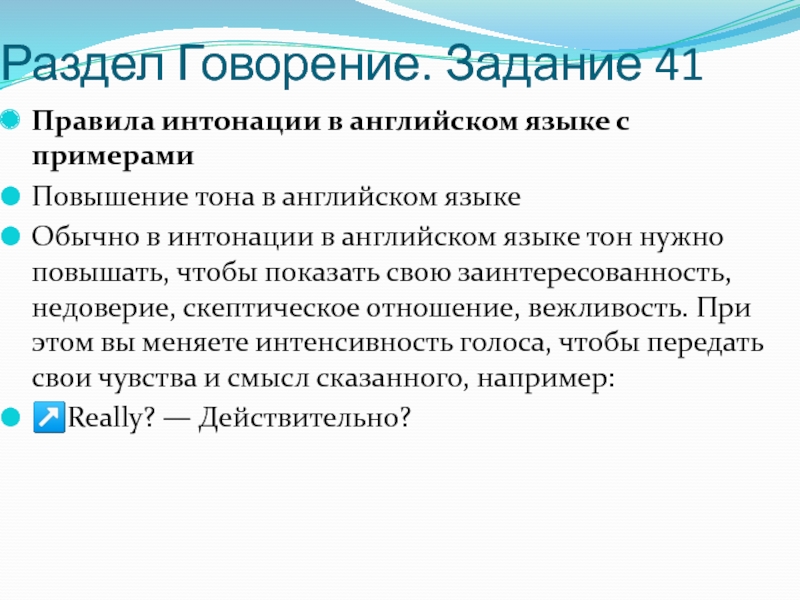
Слайд 35Раздел Говорение. Задание 41
Мы используем восходящую интонацию в следующих случаях:
В
вопросе, на который можно ответить «да» или «нет»: Do you like reading ↗books? — Ты любишь читать книги?
В предложении-просьбе:
Could you please ↗help me? — Не могли бы вы помочь мне?
После вводных слов и наречий в начале предложения: Sometimes ↗I read books. — Иногда я читаю книги.
При обращении к кому-то: ↗Luke, ↘come here. — Люк, иди сюда.
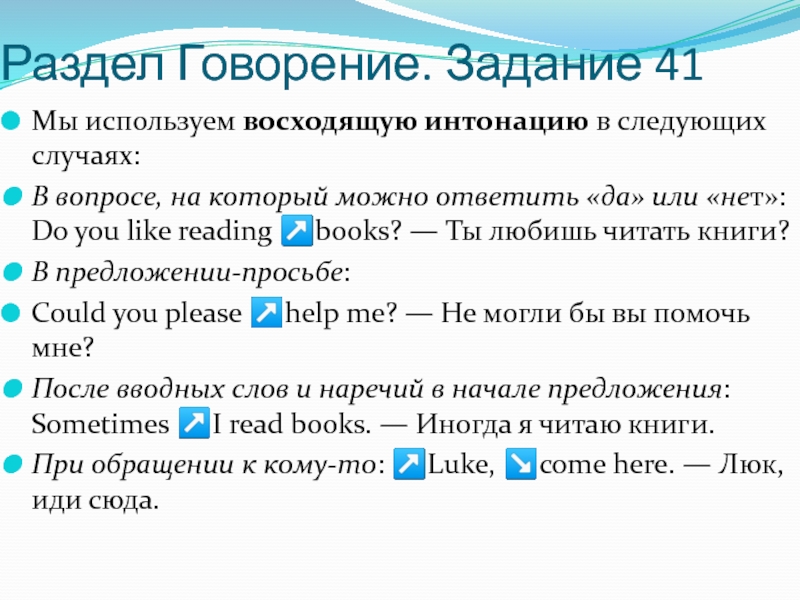
Слайд 36Раздел Говорение. Задание 41
При перечислении каждого компонента списка (кроме последнего слова
в списке):
I’m going to buy ↗chocolate, ↗meat, and ↘eggs. — Я собираюсь купить шоколад, мясо и яйца.
В начале альтернативного вопроса:
Do you ↗work or ↘relax? — Ты работаешь или отдыхаешь?
В разделительном вопросе, если вы хотите узнать ответ на него, а не уточняете информацию:
You are a teacher, ↗aren’t you? — Вы учитель, не так ли? (То есть вы не знаете, кем работает человек, высказываете свою точку зрения, но не знаете точный ответ на свой вопрос.)
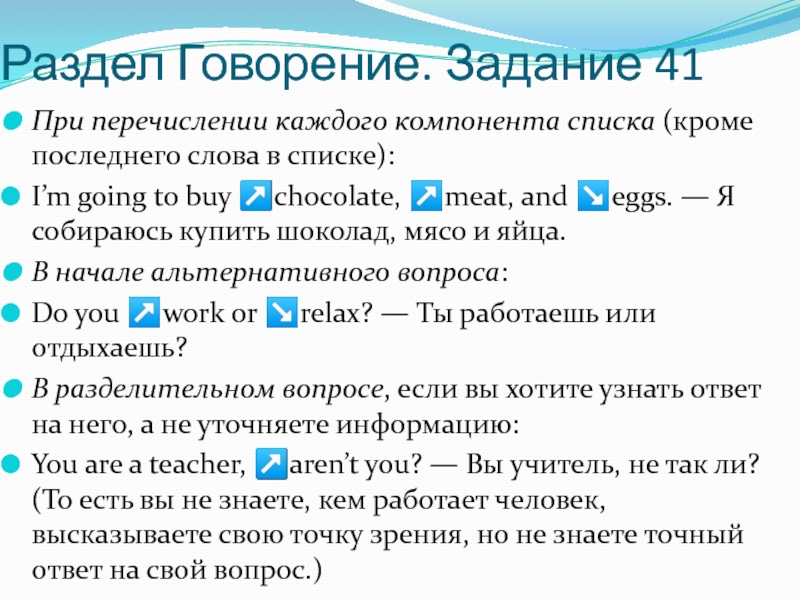
Слайд 37Раздел Говорение. Задание 41
Нисходящая интонация в английском языке используется в следующих
случаях:
При утверждении:
I like ↘reading books. — Я люблю читать книги. В специальном вопросе: ↘Where are you? — Где ты?
При команде или распоряжении. Важно этот случай не путать с просьбой. Если вы просите кого-то о чем-то, то не знаете, согласится он это сделать или нет. В случае с приказом или распоряжением нет смысла повышать тон, придавая ему вопросительные нотки. Вы и так знаете, что команда будет выполнена, поэтому скорее утверждаете, а не вопрошаете:
↘Help him. — Помогите ему.
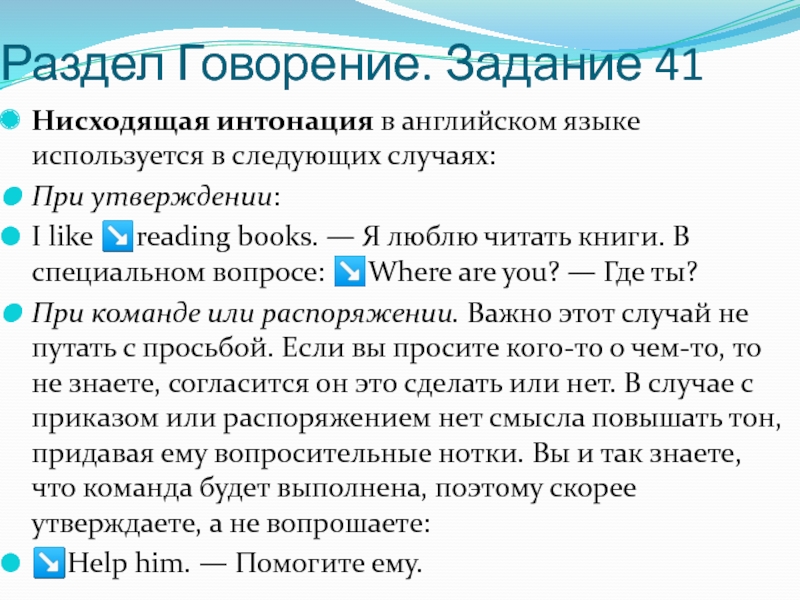
Слайд 38Раздел Говорение. Задание 41
В восклицательном предложении:
How ↘interesting! — Как интересно!
Во второй части альтернативного вопроса:
Is it ↗Mary or ↘Sarah? — Это Мэри или Сара?
В разделительном вопросе, если вы и так знаете на него ответ, просто уточняете информацию (по факту вы утверждаете что-то):
You haven’t bought any meat, ↘have you? — Ты не купил мясо, не так ли?
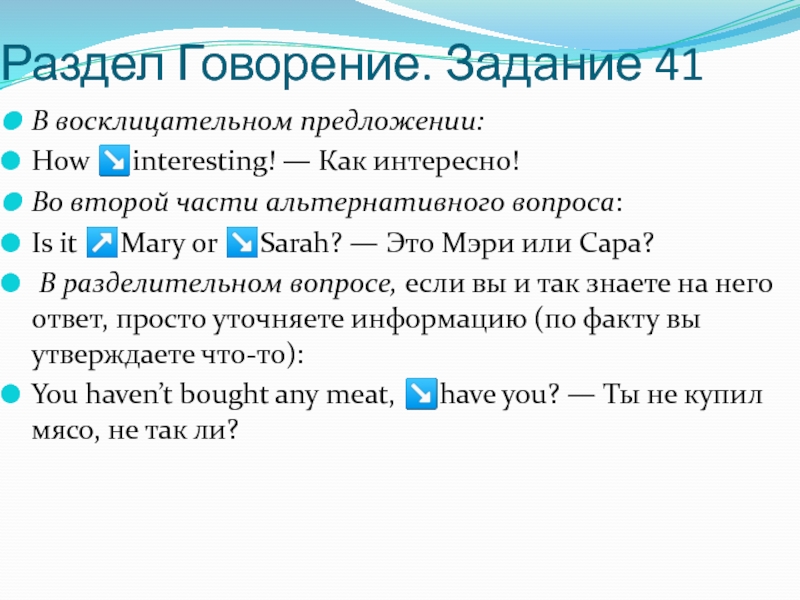
Слайд 39Раздел Говорение. Задание 41
Логическое ударение в английском и русском языках ставится
по простому принципу: вы акцентируете голосом слово, на котором лежит основная смысловая нагрузка. Приведем пример. Вы хотите сказать простую фразу “I see red apples in this picture” — «Я вижу красные яблоки на этой картине». Как можно поставить ударение:
I see red apples in this picture — Я вижу красные яблоки на этой картине. Вы подчеркиваете, что видите именно красные яблоки, а не зеленые или желтые.
I see red apples in this picture — Я вижу красные яблоки на этой картине. Вы говорите, что видите именно яблоки, а не клубнику или персики.
I see red apples in this picture — Я вижу красные яблоки на этой картине. Вы акцентируете внимание на том, что красные яблоки находятся именно на картине, а не в вазе на столе.
I see red apples in this picture — Я вижу красные яблоки на этой картине. Вы подчеркиваете, что красные яблоки вы видите именно на этой картине, а не какой-то другой. Как видите, элементарное предложение может передавать разную информацию в зависимости от того, на какое слово упадет логическое ударение.
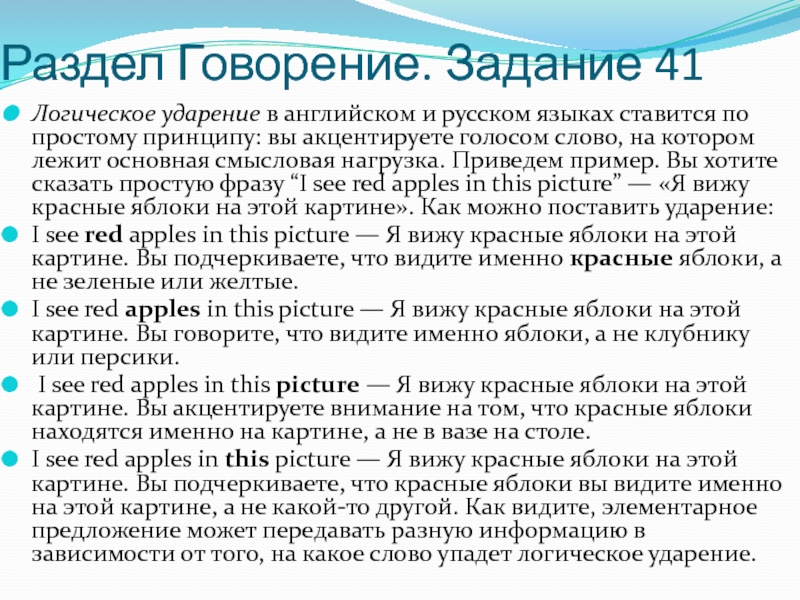
Слайд 40Раздел Говорение. Задание 41
Как выработать английскую интонацию? Лайфхаки.
Слушайте, как говорят носители
английского языка, и повторяйте за ними
В фильмах и сериалах производства Великобритании и США. ,
В аудиоподкастах http://englex.ru/6-websites-with-english-podcasts/ ,
В аудиокнигах.,
В различных видеороликах. (Ютуб блогеры)
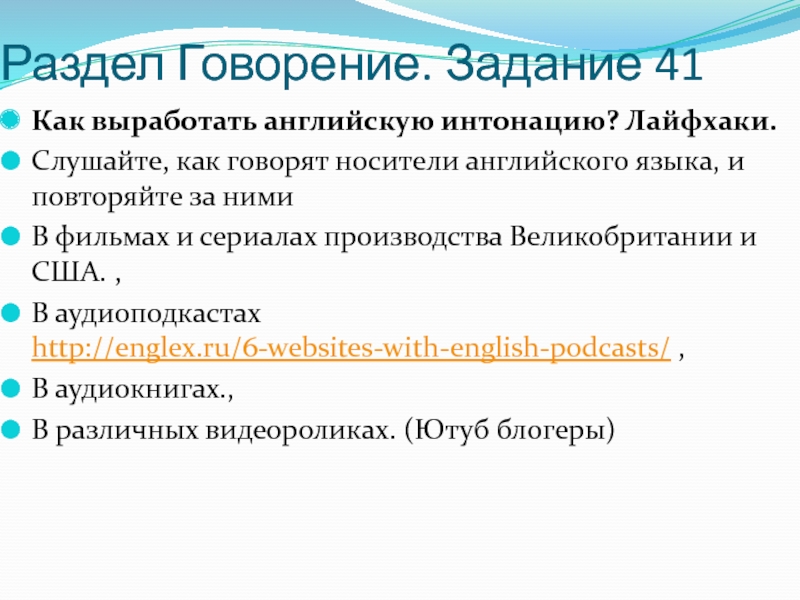
Слайд 44Домашнее задание
Макмиллан : Юнит 12, задания A,В,С (до среды,18:00)
Записать аргументы Youth
Problems / Global problems (до пятницы, 18:00)
ДЗ писать от руки(разборчиво!). Фото работы прислать на e-mail!
При отправке письма, в графе КОМУ писать 2 адреса эл.почты. :
1849387@mail.ru , marina_leskovets@mail.ru
В ТЕМЕ письма пишите свои ИМЯ и ФАМИЛИЮ, ДЗ от 28.02
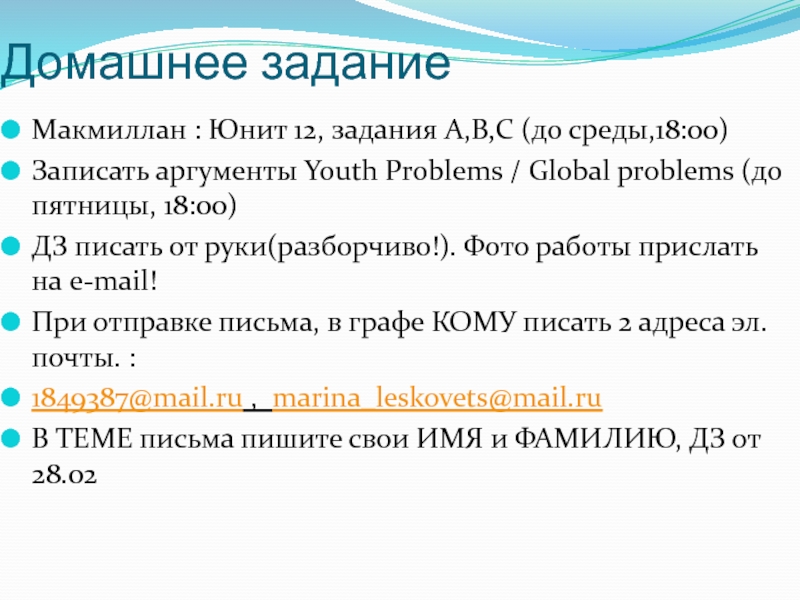
Unit 12. THE LAW AND CRIME
Topic vocabulary
-
Proof — Isbot (ma’lumot)
-
Evidence — Dalil, fakt
-
Suspect — Shubha qilmoq
-
Arrest — Qamoqqa olmoq
-
Charge — Ayblamoq
-
Suspect — Shubha ostidagi odam, gumondor
-
Accused — Aybdor
-
Decision — Qaror
-
Verdict — Hukm
-
Commit — Sodir etmoq
-
Break — Buzmoq (qonunni)
-
Rule – qoida
-
Law – qonun
-
Justice – adolat
-
Right – huquq
-
Judge – sudya
-
Jury – sud maslahatchisi
-
Prosecute – qonun yo’li bilan taqib qilmoq
-
Persecute – kamsitish (diniy, irqiy)
-
Capital punishment – oliy jazo
-
Corporal punishment – jismoniy jazo
-
Robber – o’g’ri, bezori
-
Burglar – qulf buzar
-
Thief – o’g’ri
-
Vandal – zolim odam
-
Hooligan – bezori (ko’chada baqir-chaqir qiladigan)
-
Sentence – hukm
-
Imprison – ozodlikdan mahrum qilmoq
-
Innocent – aybsiz
-
Guilty – aybdor
-
Witness – guvoh (ko’rgan)
-
Bystander — guvoh (o’zi ishtirok etgan)
-
Lawyer – huquqshunos
-
Solicitor – maslahatchi, advokat
-
Phrasal verbs
-
Back down — Fikridan qaytarish
-
Break out — Qochish (qamoqdan)
-
Bring in — Tanishtirmoq
-
Chase after — Quvmoq, taqib qilmoq
-
Come forward — O’z hohishi bilan yordam bermoq
-
Get away with — Suvdan quruq chiqmoq
-
Go off — To’satdan otilib ketmoq
-
Hand in — Topshirmoq
-
Hold up — Zo’ravonlik bilan o’g’irlamoq
-
Let off — Osonlikcha qo’yib yubormoq
-
Look into — Fosh qilmoq
-
Make off — Qochmoq
-
Take down — Yozib olmoq, tushurmoq
-
Take in — Aldamoq
-
Phrases and collocations
-
Account — Hisob raqam
-
On account of — Ning hisobida
-
Take into account — Hisobga olish
-
Account for sth — Tashkil etish, javob berish
-
Advantage — Afzallik
-
Take advantage of sth/sb — Ustun bo’lish
-
Have an advantage over sth/sb — Ustunlikka ega bo’lmoq
-
At an advantage — Ustun
-
An/one advantage (of sth) – Biro narsaning ustunligi
-
Blame — Ayblamoq
-
Be to blame (for sth/doing) — Ayblanuvchi bo’lish
-
Get/take the blame (for sth/doing) — Aybni o’z bo’yniga olmoq
-
Put the blame on sth/sb — Aybni bo’yniga yuklamoq
-
Blame on sth/sb /Blame sb for sth/doing — Biror kishini nimadadir ayblamoq
-
Damage — Zarar
-
Do damage (to sth) — Zarar yetkazmoq
-
Cause damage (to sth) — Zararga sabab bo’lmoq
-
At fault — da aybdor
-
Find fault with sth/sb — Ayb topmoq
-
Intention – Maqsad
-
Have the/no intention of doing — Bajarish niyati bo’lish/bo’lmaslik
-
Mistake — Xato
-
Make a mistake — Xato qilmoq
-
A mistake (to do) — Xato bo’lmoq
-
Mistake sb for sb — Adashtirmoq
-
Do sth by mistake — Adashib bajarmoq
-
Necessary — Kerak, zarur
-
Necessary(for sb) to do — Bajarish zarur
-
Order — Buyruq
-
In order — Tartibda
-
Put sth in order — Tartibga solmoq
-
In order to do – maqsadida qilmoq
-
Give an order (to sb)(to do) — Buyruq bermoq
-
Permission — Ruxsat
-
Give sb permission to do — Ruxsat bermoq
-
Ask (sb) for permission to do — Ruxsat so’ramoq
-
Have/ask for permission (from sb) to do — Ruxsat so’ramoq
-
Get permission (from sb) to do — Ruxsat olmoq
-
Purpose — Maqsad
-
Do sth on purpose — Ataylab qilmoq
-
Purpose of sth — Ning maqsadi
-
Reason — Sabab
-
Reason why — Uchun sabab
-
Reason for sth/ Reason with sb — Muomila bilan tushuntirmoq/uchun sabab qilib ko’rsatmoq Solution — Yechim
-
Have a solution to sth — Yechim bo’lmoq
-
Find a solution to sth — Yechim topmoq
-
Think of a solution to sth — Yechimni o’ylamoq
-
Work out a solution to sth — Yechim o’ylab topmoq
-
Come up with/figure out a solution to sth — Yechim o’ylab topmoq T
-
Wrong — Xato
-
Do wrong – xato qilmoq, noto’g’ri qilmoq
-
Do the wrong thing – noto’gri bajarmoq
-
The wrong thing to do — Bajarishga xato
-
Go wrong — Adashmoq
-
The wrong way up — Noto’g’ri yo’l
-
Word patterns
-
Accuse — Ayblamoq
-
Accuse sb of sth/doing — Kimnidir nimadadir ayblamoq
-
Arrest — Qamoqqa olmoq
-
Arrest sb for sth/doing — Kimnidir nimadadir ayblamoq
-
Charge — Ayblamoq
-
Charge sb with sth — Kimnidir nimadadir ayblamoq
-
Claim — Da’vo
-
Claim to be/to do/that — Da’vo qilmoq
-
Deny — Rad etmoq
-
Deny sth/doing – qilishni rad etmoq
-
Doubt sth/that/if/whether — Shubha qilmoq
-
Forgive sb for sth/doing — Kimnidir nimadir uchun kechirmoq
-
Forgive — Kechirmoq
-
Glimpse — Nazar
-
Glimpse sth — Nazar tashlamoq
-
Catch a glimpse of sth- ko’rib qolmoq
-
Guilty of sth/doing — Aybdor bo’lmoq
-
Guilty — Aybdor
-
Legal (for sb) to do — Qonuniy bo’lmoq
-
Make — Qilmoq, yasamoq
-
Make sb do — Majburlamoq
-
Smb be made to do — Majburlamoq
-
Refused — Rad etmoq
-
Refuse to do sth — Biror narsani qilishni rad etmoq
-
Refuse sth — Biror narsani rad etmoq
-
Respect sth — Xurmat qilmoq
-
Respect sb for sth/doing — Kimnidir nimadir uchun hurmat qilmoq
-
Have respect for sb/sth — Xurmati bo’lmoq
-
Threaten — Qo’rqitmoq
-
Threaten to do — Qilish bilan qo’rqitmoq
-
Threaten sb with sth — Kimnidir nimadir nimadir bilan qo’rqitmoq
-
Word formation
-
Accuse (v) — Ayblamoq
-
Accused (adj) — Aybdor
-
Accusation (n) — Ayblov
-
Addict (n) — Giyohvand
-
Addicted (n) — Berilib ketgan
-
Addictive (adj -) O’ziga tortadigan
-
Addiction (n) — Mayl, zararli odatga chalinish
-
Convict (v) — Hukm qilmoq
-
Convicted (adj) — Hukm qilingan
-
Conviction (n) — Hukm qilish
-
Crime (n) — Jinoyat
-
Criminal (adj,n) — Jinoiy, jinoyat
-
Evident (adj) — Aniq
-
Evidence (n) — Dalil
-
Evidently (adv) — Aniq
-
Forge (v) — Sohtalashtirmoq
-
Forgery (n) — Sohtalashtirish
-
Forger(n) — Qallob, temirchi
-
Honest (adj) — Vijdonli
-
Dishonest (adj) — Vijdonsiz
-
Honesty (n) — Halollik
-
Dishonesty (n) — Vijdonsizlik
-
Honestly (adv) — Vijdonli
-
Dishonestly (adv) – Vijdonsizlik bilan
-
Investigate (v) — Fosh qilmoq, tergov qilmoq
-
Investigative (adj) — Fosh qilinadigan, tergov qilinadigan
-
Investigation (n) — Tergov, tekshiruv
-
Investigator (n) — Tergovchi
-
Law (n) — Qonun
-
Lawyer (n) — Huquqshunos
-
Lawful (adj) — Qonuniy
-
Unlawful (adj) — Noqonuniy
-
Murder (v,n) — Odam o’ldirmoq, qotillik
-
Murderer (n) — Qotil
-
Offence (n) — Haqorat
-
Offensive (adj) — Haqoratomuz, zo’ravonlikka asoslangan
-
Offend (v) — Haqorat qilmoq, qonunni buzmoq
-
Offender (n) — Qonun buzuvchi, jinoyatchi
-
Prison (n) Qamoq
-
Prisoner (n) — Maxbus
-
Imprison (v) — Qamoqqa olmoq
-
Imprisoned (adj) — Qamoqqa olingan
-
Imprisonment (n) — Qamoqqa olish, hukm qilish
-
Prove (v) — Isbotlamoq
-
Proof (n) — Isbot
-
Proven (adj) — Isbotlangan
-
Unproven (adj) — Isbotlanmagan
-
Disprove (v) — Noto’g’riligini isbotlamoq
-
Rob (v) — O’g’irlamoq
-
Robbery (n) — O’g’irlik
-
Robber (n) — O’g’ri
-
Secure (v) — Mustahkamlamoq, himoya qilmoq
-
Secure (adj) — Mustahkam, ishonchli
-
Insecure (adj) — O’ziga ishonmaydigan, ichidagini aytmaydigan
-
Security (n) — Xavfsizlik
-
Insecurity (n) — Xavflilik
-
Theft (n) — O’g’irlik
-
Thief (n) — O’g’ri
-
Unit 14. HEALTH AND FITNESS
-
Topic vocabulary
-
Prescription — Dori retsepti
-
Recipe — Taom retsepti
-
Operation — Operatsiya
-
Surgery — Operatsiya (majburiy , davolash)
-
Sore — Tomoq og’rig’i
-
Hurt — Jarohatlanmoq
-
Pain — Og’riq
-
Illness — Kasallik (aniq bir)
-
Disease — Kasallik
-
Injured — Jarohatlangan
-
Damaged — Zararlangan
-
Thin — Ozg’in (kassallik)
-
Slim – ozg’in (Kelishgan)
-
Remedy — Kichik kasallikka davo
-
Cure — Davolamoq, dori- darmon
-
Therapy — Davo, muolaja
-
Affect — Ta’sir
-
Result — Natija
-
Healthy — Sog’lom
-
Fit — Sog’lom (jismoniy harakatga nisbatan)
-
Examine — Tekshirmoq
-
Investigate — Voqeani tekshirmoq
-
Infection — Infeksiya
-
Pollution — Ifloslanish
-
Plaster — Gips
-
Bandage — Bint
-
Ward — Bo’lim (yotib davolansa bo’ladi)
-
Clinic – Klinika
-
Dose — Doza, dori bermoq
-
Fix — Belgiiangan miqdorda doza bermoq (og’riq qoldirish uchun)
-
Fever — Isitma (bezgak)
-
Rash — Toshma
-
Phrasal verbs
-
Break out — To’sattan boshlanmoq (yong’in, urush uchun)
-
Bring on — Olib kelmoq, sabab bo’lmoq
-
Come down with — Kichik kasallikdan azoblanishni boshlamoq
-
Come round/to — O’ziga kelmoq
-
Cut down (on) — Miqdorini kamaytmoq (chekishni)
-
Feel up to — Yetarlicha yaxshi his qilmoq
-
Get over — Tuzalmoq
-
Give up — Tashlamoq
-
Look after — G’amxo’rlik qilmoq
-
Pull through — Yengib chiqmoq, omon qolmoq
-
Put down — O’ldirmoq (kasal yoki qari hayvonni)
-
Put on — Semirmoq
-
Wear off — Tasiri tugamoq
-
Phrases and collocations
-
Alternative — Muqobil
-
Alternative — Tabiblik
-
Medicine- tibbiyot
-
therapy – terapiya, muolaja (igna sanchishga o’xshash)
-
Find an alternative to sth — Muqobil variant topmoq
-
Appointment — Uchrashuv
-
Make/have/break an appointment — Uchrashuv belgilamoq/ bo’lmoq/ni buzmoq
-
Bath — Vanna
-
Have/take a bath — Vanna qabul qilmoq
-
Run a bath (for sb) kimnidir vannasida cho’milmoq
-
Danger — Xavf
-
In danger — Xavf ostida
-
Out of danger — Xavfsiz
-
Exercise — Mashq
-
Do (an) exercise — Mashq bajarmoq
-
Take/get (some) exercise — Mashq olish
-
Fit — Sog’lom
-
Get/stay/keep/be fit — Sog’lom bo’lmoq
-
Fit and healthy — Formada
-
Good — Yaxshi
-
Do sb good — Yaxshilik qilmoq
-
Sth does you good — Bu sizga foyda beradi
-
Good for sb (to do) — ga yaxshilik qilmoq
-
Health — Sog’lik
-
In good/bad/poor health — Yaxshi/yomon/juda yomon sog’likda
-
Health center — Sog’lik markazi
-
Health care — Tibbiy xizmat
-
Injection — Ukol qilish
-
Have an injection (for/against sth) — Uchun/qarshi ukol olish
-
Give sb an injection — Kimnidir ukol qilmoq
-
Medicine — Dori-darmon
-
Take medicine — Dori qabul qilmoq
-
Prescribe medicine — Dori yozib bermoq
-
Practice/study medicine — Tibbiyotni mashq qilmoq/o’rganmoq
-
The best medicine — Eng zo’r dori
-
Alternative medicine — Giyoh
-
Shape — Shakl
-
Get in /into shape — Shaklga kirmoq
-
Stay/keep in shape — Shaklda qolmoq
-
The shape of sth — Ning shakli
-
In the shape of — Shaklda
-
Spread — Yoymoq, tarqalmoq
-
Spread sth — Ni yoymoq
-
Spread sth over/on sth — Ustiga sepish
-
Spread to a place — Joyga tarqalmoq
-
Wordpatterns
-
Addicted — O’rgangan
-
Addicted to sth — O’rganib qolgan
-
Attempt — Urinib ko’rmoq
-
Attempt to do — Qilishga urinib ko’rmoq
-
Benefit from sth — Dan foyda
-
A benefit of sth — Foydasi
-
Complain — Shikoyat qilmoq
-
Complain (to sb) (about sth/sb doing) — Biror kishiga biror narsa haqida shikoyat qilmoq
-
Complain of sth — Dan shikoyat
-
Cope — Uddalamoq
-
Cope with sth/doing – ni uddasidan chiqmoq
-
Inject — Ukol qilmoq
-
Inject sth into sth/sb — Ichiga tiqmoq
-
Lead — Yo’l ko’rsatmoq, boshqarmoq
-
Lead to sth/(your) doing — Ga olib kelish
-
Likely to do — Ehtimol
-
It is (un)likely that — Ehtimoli bor
-
Need to do — Kerak, zarur
-
Need doing — Qilinishi kerak
-
In need of — Ga ehtiyoji bor
-
No need for — Shart emas
-
Operate on sb/sth — Ni operatsiya qilmoq
-
Suffer (from) sth — Dan aziyat chekmoq
-
Tired of sth/doing — Dan charchagan
-
Try to do — Bajarishga harakat qilmoq
-
Try sth/sb/doing — Sinab ko’rmoq
-
Try and do — Urinib ko’rchi
-
Worry about sth/sb doing — Haqida tashvishlanmoq
-
Worried that — Dan tashvishlanmoq
-
Worried about/by – dan xavotirlanmoq
-
Worth — Baho, qiymat
-
Worth sth/doing – Arziydi
-
Word formation
-
Allergy (n) — Allergiya
-
Allergic (adj) — Allergik
-
Aware (adj) — Xabardor, biluvchi
-
Unaware (adj) — Uquvsiz, zehni past
-
Awareness (n) — Xabardorlik
-
Benefit (n) — Foyda
-
Benefitical (adj) — Foydali
-
Comfort (n) — Qulaylik
-
Discomfort (n) — Noqulaylik
-
(Un)comfortable (adj) — Qulay, (noqulay)
-
(Un)comfortably (adv) – (no)qulay tarzda
-
Emphasis (n) — Urg’u
-
Emphasise (v) — Urg’u bermoq
-
Emphatic (adj) — Urg’u bilan aytiladigan
-
Fit (adj) — Sog’lom
-
Unfit (adj) — Xasta
-
Fitness (n) — Sog’lomlik
-
Ill (adj) — Kasal
-
Illness (n) — Kasallik
-
Inject (v) — Ukol qilmoq
-
Injection (n) — Ukol
-
Injure (v) — Jarohatlanmoq
-
Injury (n) — Jarohat
-
Injuries (n) — Jarohatlar
-
Operate (v) — Operatsiya qilmoq
-
Operation (n) — Operatsiya
-
Operator (n) — aloqa o’rnatuvchi
-
Operating (n) — Operatsiya qilish
-
Cooperate (v) – hamkorlik qilmoq
-
Cooperation (n) – korparatsiya, hamkorlik
-
(Un)cooperative (adj) (no)hamkorlikdagi
-
Poison (v,n) — Zaharlamoq, zahar
-
Poisonous (adj) — Zaharli
-
Poisoning (n) — Zaharlanish
-
Recover (v) — Tuzalmoq
-
Recovery (n) — Tuzalish
-
Strong(ly) (ad, advj) — Kuchli, baquwat
-
Strength (n) — Kuch, quwat
-
Strengthen (v) — Kuchaytirmoq, quvvatlantirmoq
-
Surgery (n) — Jarrohlik, xirurgiya
-
Surgeon (n) — Jarroh, xirurg
-
Surgical(ly) (adj, adv) — Xirurgik, jarrohlikka oid
-
Treat (v) — Davolamoq
-
Treatment (n) — Davolash
-
Unit 16. FOOD AND DRINK
-
Topic vocabulary
-
Chop — Go’shtni chopish
-
Slice — Kichgina qilib to’g’rash
-
Grate — Qirg’ichdan o’tkazish
-
Bake — Non yopish
-
Grill — Qovurilgan go’sht
-
Fry — Qovurmoq (tovada)
-
Roast — Qovurmcq, qizartirmoq
-
Boil — Qaynatmoq
-
Cook — Oshpaz, pishirmoq
-
Cooker — Gaz plitasi
-
Chef — Bosh oshpaz
-
Oven — Pechka
-
Grill — Qo’rada pishirmoq
-
Hop — Gaz plitasining olov chiqadigan joyi
-
Kitchen — Oshxona
-
Cuisine — Taomlar, pishiriq
-
Lunch — Tushlik
-
Dinner — Kechgi ovqat
-
Plate — Tarelka
-
Bowl — Kosa
-
Saucer — Likopcha
-
Dish – ldish, ovqat
-
Vegetable — Sabzavot
-
Vegetarian — Go’sht yemaydigan
-
Vegan — Faqat ko’kat yeydigan (o’txo’r)
-
Fast food — Tez pishar ovqat
-
Take away — Olib ketiladigan ovqat
-
Kettle — Choynak (qaynatadigan)
-
Teapot — Chiynak (damlanadigan)
-
Freezer — Marazilnik
-
Fridge – muzlatgich, Sovutgich
-
Frozen — Muzlagan
-
Freezing — Ayozli
-
Mix — Aralashtirmoq
-
Stir — Kovlab aralashtirmoq
-
Whisk — Ko’pirtirgich bilan aralashtirmoq
-
Soft drink — Yaxna ichimlik
-
Fizzy drink — Gazli suv
-
Menu — Menyu (taomnoma)
-
Catalogue – Catalog (modular, va soch stili uchun)
-
Phrasal verbs
-
Drop in (on) — Kirib o’tish, tasodifiy uchrashuv
-
Get on (for) — Yetib olish
-
Go off — Aynimoq
-
Go on — Davom ettirmoq
-
Go round — Aylanib kelmoq (mehmon)
-
Come round – mehmonga jelmoq
-
Keep on — Davom ettirmoq
-
Leave out — Qoldirib ketmoq
-
Put off — Ko’nglini qoldirmoq
-
Run into — Tasodifan uchrashmoq
-
Run out of — Tugab qolmoq
-
Take to — Boshlamoq (odatni)
-
Try out — Tatib ko’rmoq, urinib ko’rmoq
-
Turn out — Bu shunday bo’ldiki
-
Turn up — Pay do bo’lmoq (kutilmaganda)
-
Phrases and collocations
-
Cook — Oshpaz
-
A good cook / Agreat cook — Yaxshi / zo’r oshpaz
-
Cook a meal — Ovqat pishirmoq
-
Cook a chicken — Jo’ja pishirmoq
-
Do the cooking — Pishirish ishlarini qilmoq
-
Drink – Ichimlik ichmoq
-
Make (sb) a drink — Ichimlik tayyorlab bermoq
-
Have a drink (of smth)/ Drink smth — Ichmoq
-
Drink to sb/ Drink to sb’s health — Kimnidir sog’ligi uchun ichmoq
-
Drink a toast to sb — Qadah ko’tarmoq
-
Feed — Boqmoq
-
Feed an animal — Hayvon boqmoq
-
Feed on smth — Dan oziqlanmoq
-
Fill — To’ldirmoq
-
Fill smth up — Ni to’ldirmoq
-
Filled with sth — Bilan to’la
-
Full of sth — Dan/ga to’la
-
Food — Ovqat
-
Make/ Prepare/ Cook food — Ovqat pishirmoq
-
Serve food — Ovqat suzmoq
-
Fast food – tez pishar ovqat
-
Junk food -Tez pishar ovqat (kasal keltirib chiqaradigan, semirtirib yuboradigan)
-
Pet food — Hayvonlar ovqati
-
Health food — Sog’liqbop ovqat
-
Meal – Taom, ovqat
-
Make / Cook a meal — Ovqat pishirmoq
-
Have a meal — Ovqatlanmoq
-
Go out for a meal — Ovqatlanish uchun tashqariga chiqmoq
-
Note – Qayd, eslatma
-
Make/take/keep a note of sth — Eslab qolmoq
-
Note sth down — Eslab qolmoq / yozib olmoq
-
Occasion — Sabab, holat
-
On this/that occasion — Shu/o’ sha holatda
-
On occasion — Gohida
-
On the occasion of sth — Ehtimoli yaxshi bo’lshi mumkin
-
Special occasion -Maxsus tadbir / esda qolarli
-
Recipe — Retsept
-
Follow a recipe — Retseptgs rioya qilmoq
-
Recipe book — Taomlar kitobi
-
Recipe for disaster — Falokat uchun ko’rsatma
-
Table — Stol, dasturxon
-
Lay/set the table — Stol/dasturxon tuzamoq
-
Clear the table — Stolni tozalamoq
-
Book /reserve a table — Stol buyirtirmoq
-
Wash — Yuvmoq
-
Wash the dishes — Idishlami yuvmoq
-
Wash one’s hand’s — Qo’llarni yuvmoq
-
Do the washing up — Idishlami yuvmoq
-
Dishwasher — Idish yuvadigan mashina
-
Washing machine — Kir yuvadigan mashina
-
Word patterns
-
Associate smb/smth with smb/smth – bilan bog’liq, kasbdosh
-
Careful with/about/of smth – da ehtiyotkor, da hushyor
-
Choose between – o’rtasidagi tanlov
-
Choose to do – bajarishga tanlov
-
Compliment smb on smth – maqtamoq, hushomat qilmoq
-
Full of smth – dan, ga to’la
-
Lack smth/lack of smth/lacking in smth –ning yetishmasligi
-
Offer smb/smth/offer smth to smb – taklif qilmoq
-
Offer to do – biror ishni bajarishga taklif qilmoq
-
Regard smb as smth –kimnidir nimadir uchun hurmat qilmoq
-
Remember to do – qilishi kerek bo’lgan ishni eslamoq
-
Remember doing – qilingan ishni eslamoq
-
Remember that – ni eslamoq
-
Suggest doing/smth to smb –taklif qilmoq
-
Suggest that – ni taklif qilmoq
-
Tend to do – ga moyil bo’lmoq
-
Wait for smth/smb – ni kutmoq
-
Wait for smth to do – …ni uchun kutmoq
-
Wait and see – uchrashmoq
-
Willing to do – xohish
-
Word formation
-
Anxious(ly) (adj/adv)–xavotirli
-
Anxiety (n) – xavotir
-
Appreciate (v) –qadrlamoq
-
(un)appreciative (adj/adv) – qadrli(siz)
-
Appreciation (n) –minnatdorchilik
-
Contain (v) – o’z ichiga olmoq
-
Container (n) – idish
-
Content (n) – mundarija
-
Creat (v) — Yaratmoq
-
Creative(ly) (adj, adv) — Yaratuvchan
-
Creation (n) — Yaratish, ijod
-
Creativity (n) — Yaratuvchanlik
-
Creator (n) — Yaratuvchi
-
Disgust (n, v) — Nafrat (uyg’otmoq)
-
Disgusting (adj) — G’ashni keltiradigan
-
Disguted (adj) — Nafratlangan, jirkangan
-
Grow (v) — O’smoq, o’stirmoq
-
Growth (n) — O’sish
-
Grown up (adj) — Ulg’aygan
-
Growing (n) — O’sish, ulg’ayish
-
Grown (adj) — Ulg’aygan
-
Home grown (adj) – Uyda o’stirilgan
-
Grower (n) — O’smir
-
Mix (v) — Aralashtirmoq
-
Mixed (adj) — Aralashgan
-
Mixture (n) — Aralashma
-
Mixer (n) — Aralashtirgich
-
Origin (n) — Kelib chiqish, manba
-
Original(ly) (adv) — Asl
-
Unoriginal(ly) (adv) — Asl emas (o’zlashtirilgan)
-
Originate (v) — Keltirib chiqarmoq
-
Originator (n) — Keltirib chiqaruvchi
-
Prepare (v) — Tayyorlamoq
-
Preparation (n) — Tayyorlash
-
Preparatory (n) — Tayyorgarlik
-
Prepared (adj) — Tayyorlangan
-
Unprepared (adj) — Tayyorlanmagan
-
Safe(ly) (ad, advj) — Xavfsiz
-
Unsafe(ly) (adj, adv) — Xavfli
-
Save (v) — Saqlamoq, asramoq
-
Safety (n) — Xavfsizlik
-
Savior (n) — Xaloskor
-
Saver (n) — Qutqaruvchi
-
Surprise (v) — Hayron qoldirmoq
-
(Un)surprising(ly) (adj, adv) — Hayratlanarli, j (hayratlantirmaydigan)
-
Surprised (adj) — Hayron qolgan
-
Sweetfly) (adj, adv) — Shirin
-
Sweetener (n) — Shakar o’rnini bosuvchi
-
Sweetness (n) — Shirinlik
-
Thoroughly) (adj, adv) — Puxta, to’la
-
Thoroughness (n) — Puxtalik
-
Unit 18. EDUCATION AND LEARNING
-
Topic vocabulary
-
Take — Topshirmoq
-
Pass — O’tmoq
-
Read — O’qimoq
-
Study — Maktab, universitetda o’qimoq
-
Test — Test
-
Exam — Imtixon
-
Primary — Boshlang’ich maktab
-
Secondary — O’rta maktab
-
High — Yuqori maktab
-
Colleague — Kasbdosh
-
Classmate — Sinfdosh
-
Prefect — Klaskom
-
Pupil — O’quvchi
-
Student — Talaba
-
Qualifications — Malaka
-
Qualities — Sifat, harakter
-
Count — Sanamoq
-
Measure – O’lchamoq
-
Degree — Daraja, diplom
-
Certificate — Sertifikat
-
Result — Natija
-
Speak — Gapirmoq
-
Talk — Suxbatlashmoq
-
Lesson — Dars
-
Subject — Fan, mavzu
-
Achieve — Erishmoq
-
Reach — Yetmoq
-
Task — Vazifa
-
Effort — Urinish
-
Recognize — Tanimoq
-
Teach — O’qitmoq
-
Learn — O’rganmoq
-
Phrasal verbs
-
Catch on — Tushunmoq
-
Come (a)round (to) — Xushiga kelmoq, fikrini o’zgartirmoq
-
Cross out — Xatoni chizib qo’ymoq
-
Dawn on — To’satdan esiga kelmoq
-
Deal with — Kelishmoq, uddalamoq
-
Drop out (of) — Maktabni, o’qishni tashlab ketmoq
-
Get at — Tushuntirishga urinmoq
-
Get on with — Davom ettirmoq
-
Give in — Urinishni to’xtatmoq
-
Keep up with — Yetmoq, yetishmoq
-
Sail through — Osongina bajarmoq
-
Set out — Maydalab tushuntirmoq
-
Think over — O’ylab ko’rmoq
-
Phrases and collocations
-
Attention — Diqqat
-
Pay attention (to sth/sb) — Diqqatni jalb qilmoq
-
Attract (sb’s) attention/ Draw sb’s attention to sth — E’tiborini biror narsaga jalb etish
-
Break — Tanaffus
-
Have/take a break (from sth/doing) — Tanaffus qilmoq
-
Lunch break — Katta tanaffus
-
Tea break — Kichkina tanaffus
-
Commercial break — Reklama
-
Give sb a break — Holi qo’yish, tinch qo’yish, tushuntirish
-
Discussion — Muhokama
-
Have a discussion (with sb) about/on sth/doing — Muhokama qilmoq
-
Exam — Imtixon
-
Take/do an exam — Imtixon topshirmoq
-
Have an exam — Imtixonga bor bo’lmoq
-
Pass an exam — Imtihondan o’tmoq
-
Fail an exam — Imtihondan yiqilmoq
-
Sit (for) an exam — Imtihonda o’tirmoq, imtihon topshirmoq
-
Homework — Uyga vazifa
-
Do your homework — Uyga vazifani bajarmoq
-
Have homework to do — Bajarishga uyga vazifasi bo’lmoq
-
Idea — G’oya
-
Question an idea — Ishonmaslik, so’rov, fikr
-
Have an idea — G’oya bo’lmoq
-
Bright idea — Ajoyib fikr
-
Have no idea (about) — (Haqida) g’oya bo’lmaslik
-
Learn — O’rganmoq
-
Have a lot to learn about smth/doing — Biror narsa haqida ko’p o’rganmoq
-
Learn (how) to do — Qanday bajarishni o’rganmoq
-
Lesson — Dars
-
Go to a lesson — Darsga bormoq
-
Have a lesson — Darsi bo’lmoq
-
Double lesson – 2 ta dars
-
Learn a lesson — Darsni o’rgamnoq
-
Learn your lesson — Darsni o’rganmoq
-
Teach sb a lesson — Darsni o’qitmoq
-
Mind — Qaror
-
Make up your mind (about sth/doing) — O’zingiz qaror qabul qiling
-
Bear sth in mind — Yodda tutish
-
In two minds aboutsmth/doing — Bir to’xtamga kelolmaslik
-
Change your mind about sth/doing — Fikringizni o’zgartiring
-
Cross your mind — Hayolga kelish
-
To my mind — Fikrimcha, menimcha
-
(Not) mind if — Agar shunday bo’Isa
-
Opinion — Fikr
-
In my opinion – Mening fikrimcha
-
Give an opinion (of/about sth/ doing) — Fikr bildirish
-
Express your opinion (of/about sth/doing) — Fikrni ifoda etish
-
Hold an opinion (of/about sth/doing) — Fikrida turish
-
Have an opinion (of/about sth/doing) — Fikrga ega bo’lish
-
Pass — O’tmoq
-
Pass sth (over) to sb — Uzatish
-
Pass an exam — Imtixondan o’tish
-
Pass a test — Testdan o’tish
-
Pass a building — Bino yonidan o’tish
-
Point — Lahza
-
See/take sb’s point (of/about sth/doing) — Tushinish
-
See the point in/of sth/doing — Maqsadini ko’rish
-
There is no point in sth/doing — Maqsadsiz
-
Make a point (of doing) — Rejalashtirmoq
-
Sense — His-tuyg’u
-
Make sense of sth — Biror narsani tushinish
-
It makes sense (to do) — Mantiqli
-
Sense of humour — Yumor tushunchasi, hazilni tushinish
-
Sense of taste — Ta’m tushunchasi, did
-
Sense of sight — Ko’rish tushunchasi
-
Suggestion — Taklif
-
Make a suggestion — Taklif qilmoq
-
Accept a suggestion — Taklifni qabul qilmoq
-
Word patterns
-
Able to do — Qobilyatli bo’lmoq
-
Admire sb (for smth) — Qoyil qolmoq, lol qolmoq
-
Boast of/about smth/doing (to smb) – g’ururlanmoq, maqtanmoq
-
Capable of doing – qobiliyatli bo’lmoq
-
Congratulate smb on smth/doing – tabriklamoq
-
Fail to do – da muvaffaqqiyatsizlikka uchramoq
-
Hope to do – umid qilmoq
-
Hope that – ni umid qilmoq
-
Learn about smth/doing – o’rganmoq
-
Learn to do – qilishni o’rganmoq
-
Learn by doing – bajarish orqali o’rganmoq
-
Settle for/on smth – hal qilmoq
-
Similar to smth/smb/doing – ga o’xshamoq
-
Study smth – o’rganmoq
-
Study for smth – o’qimoq
-
Succed in smth/doing – muvvaffaqiyatga erishmoq
-
Suitable for smth/doing – mos bo’lmoq
-
Suitable to do – mos bo’lmoq
-
Word formation
-
Academy (n) – akademiya
-
Academic (n) – akademik, professor
-
Attend (v) – qatnashmoq
-
Attention (n) – diqqat
-
Attentive(ly) (adj/adv) – xushyor, ziyrak
-
Inattentive(ly) (adj/adv)– xushyor emas
-
Attendance (n) – qatnashish
-
Attend (n) – xamroh
-
Behave (v) – o’zini tutmoq
-
Behavior (n) – xulq-atvor
-
Certify (v) –tasdiqlamoq
-
Certificate (n) – sertifikat
-
Certified) (adj) – sertifikatlangan
-
Educate (v) — Ta’lim bermoq
-
Education (n) — Ta’lim
-
Educator (n) — Pedagog
-
Educational(ly) (adj, adv) — Ta’limga oid
-
Fail (v) — Mofaqqiyatsizlikka uchramoq
-
Failure (n) — Mofaqqiyatsizlik
-
Failing (n) — Mofaqqiyatsizlikka uchrash
-
Improve (v) — Yaxshilamoq
-
Improvement (n) — Yaxshilanish
-
Improved (adj) — Yaxshilangan
-
Intense(ly) (adj,adv) — Keskin
-
Intensity (n) — Qizginlik, g’ayrat
-
Intensify (v) — Kuchaytirmoq
-
Literate (adj) — Savodli
-
Illiterate (adj) — Savodsiz
-
(Il)literacy (n) – (Savodsizlik), savodxonlik
-
Literature (n) — Adabiyot
-
Reason (n) — Sabab
-
Reasonable (adj) — Oqilona
-
(Un)reasonable (adj) — Nooqilona
-
Reasoning (n) — Fikr
-
Revise (v) — Qayta ko’rib chiqmoq
-
Revision (n) — Qayta ko’rib chiqish
-
Revised (adj) — Qayta ko’rib chiqilgan, tahrir qilingan, tuzatilgan
-
Scholar (n) — Olim
-
Scholarship (n) — Stipendiya
-
Scholarly (adj) — Olimlikka oid
-
Scholastic (adj) — O’qituvchi va o’quvchilikka oid
-
Study (v) — O’qimoq
-
Student (n) — Talaba
-
Studies (n) — O’qish
-
Studious (adj) — Ilm bilan band bo’lgan, tirishqoq
-
Solve (v) — Yechmoq
-
Solution (n) — Yechim
-
Solvable (adj) — Hal qilib bo’ladigan, yechsa bo’ladigan.
-
(Un)solvable (adj) — Hal qilib bo’l(may)adigan yechib bo’l(may)adigan
-
Teach (v) — O’qitmoq
-
Teacher(n) — O’qituvchi
-
Taught (adj) — O’qitilgan
-
Think(v) — O’ylamoq
-
Thought (n, adj) — O’y-fikr, o’ylangan
-
Unthinkable (adj) — O’ylab bo’l(may)adigan
-
Thought fill (adj) — G’amxo’r
-
Thought less (adj) — Beparvo
-
Understand(v) — Tushunmoq
-
Understanding(n) — Tushunish
-
Understood(adj) — Tushungan
-
Understandable(adj) — Tushunarli
-
Understandably(adv) — Tushunarli
-
Unit 20. WEATHER AND THE ENVIRENMENT
-
Topic vocabulary
-
Urban — Shahar, shaharga oid
-
Suburban — Shahar atrofidagi
-
Rural — Qishloq, qishloqqa oid
-
Smog — Zaxarli tutun
-
Fog — Tuman
-
Smoke — Sigaret tutuni
-
Mist — Qirovli tuman
-
Weather — Ob-havo
-
Climate — Iqlim
-
Forecast — Ob-havo bashorati
-
Prediction — Bashorat
-
Waste — Musor (keraksiz material)
-
Litter — Axlat chiqindi
-
Rubbish – Musor, chiqindi
-
Clean — Toza(lamoq)
-
Clear — Toza, aniq
-
Pour — Chelaklab quymoq
-
Dizzle — Maydalab yog’ish
-
Flood — Suv toshqini
-
Environment — Atrof-muhit
-
Surroundings — Atrof
-
Wind — Shamol
-
Air — Havo
-
Reservoir — Suv ombori
-
Lake — Ko’l
-
Puddle — Ko’lmak
-
Pond — Hovuz, havza
-
Thunder — Momaqaldiroq
-
Lightning — Yashin
-
Global — Global, xalqaro
-
Worldwide — Dunyo bo’ylab
-
Plain — Tekislik
-
Land — Quruqlik
-
Field — Dala
-
Desert — cho’l
-
Extinct — Noyob, yo’q bo’lib ketgan
-
Endangered — Yo’q bo’lish xavfida ostida
-
Reuse — Qayta ‘istilatish
-
Phrasal verbs
-
Call for — Talab qilmoq
-
Call off — Qoldirmoq, bekor qilmoq
-
Clear up — Yaxshilanmoq (ob- havo)
-
Cut off — Aloqani uzish
-
Die down — Pasaymoq, susaymoq
-
Do up — Remont qilmoq
-
Face up to — Ko’nikmoq
-
Get (sb) down — Umidini so’ndirish
-
Put down to — Natijasini tushuntirmoq
-
Put out — O’chirmoq
-
Set in — Kirib kelish
-
Stand for — Chidamoq
-
Tear down — Olib tashlamoq, buzmoq
-
Throw away — Otib yuborish, tashlab yuborish
-
Phrases and collocations
-
Control — Nazorat
-
Lose control(of sth) — Nazoratni yo’qotmoq
-
Take control (of sth) — Nazoratiga olmoq
-
Have control(of sth) — Nazoratga ega bo’lish
-
In control — Nazoratda
-
Out of control — Nazoratsiz, nazoratdan chiqqan
-
Effect — Ta’sir
-
Have an effect (on sth/sb) — Ta’siri bo’lmoq
-
Take effect — Kuchga kirish
-
End — Oxiri,tugamoq
-
In the end Nihoyat /At the end (of) — Ning oxirida
-
Come to an end — Oxiriga, nixoyasiga yetmoq
-
Come to the end (of sth)/ Reach to the end (of sth) – oxiriga yetmoq
-
Happy ending — Baxtli yakun
-
Floor — Pol
-
On the floor — Polda
-
On the ground floor — 1- qavatda
-
On the first floor — 2- qavatda
-
On the second floor — 3- qavatda
-
Fuss — Injiqlik
-
Make a fuss (about sth doing) — Injiqlik qilmoq
-
Cause a fuss (about sth doing) — Shov-shuvga sabab bo’lish
-
Long — Uzun
-
(for) as long as — Sharti bilan
-
(for) a long time(to do) — (uzoq) vaqt oladi
-
Long to do — Bajarishga uzoq
-
Long for sth (to do) — Intiqlik bilan kutmoq
-
Look – Qaramoq
-
Have a look at /Take a look at – ga nazar tashlamoq
-
Look like sb/sth — 0 ’ xshamoq(ko’rinishi)
-
Look at — Ga qaramoq
-
Look for — Qidirmoq
-
Mess — Tartibsizlik
-
Make a mess (of sth) — Tartibsizlik qilmoq
-
In a mess — Tartibsiz
-
Responsibility — Javobgarlik
-
Have (the) responsibility for — Ma’suliyati bo’lmoq
-
Take (the) responsibility for — Ma’suliyatni bo’yniga olish
-
Shower — Dush
-
Take a shower — Dush qabul qilmoq
-
Have a shower — dush qabul qilmoq
-
A rain shower — Mayin yomg’ir
-
A light shower of rain — Maydalab yog’adigan yomg’ir
-
A heavy shower of rain — Jala
-
Sight — Ko’rish
-
Catch sight of — Ilg’ab olish
-
Lose sight of — Ko’zdan yo’qotish
-
In sight of — Ning ko’rinishida
-
At first sight — Bir qarashda
-
Waste — Behuda sarflash
-
A waste of time — Vaqtni behuda sarflash
-
Waste your time – vaqtni behuda o’tkazish
-
Industrial waste — Sanoat chiqindisi
-
Household waste — Uy- ro’zg’or chiqindisi
-
Weather forecast — Ob-havo bashorati
-
Under the weather Ob-havo ta’sirida, xarakteri tez o’zgaradigan insonlar
-
World — Dunyo
-
All over the world — Butun dunyoda
-
Around the world — Dunyo bo’ylab
-
Throughout the world — Butun dunyo bo’yi
-
The whole world — Butun dunyo
-
In the world — Dunyoda
-
World record — Jahon rekordi
-
Word patterns
-
Aware of — Xabardor
-
Aware that – xabardor bo’lishicha
-
Covered in/with sth — Qoplamoq
-
Disappointed with/by sth — Hafsalasi pir bo’lmoq
-
Disappointed in smb – dan ko’ngli qolgan
-
Except for sth/doing — Dan tashqari
-
Expect sth/sb (to do) — Kutmoq
-
Expect that — kutilishicha
-
Familiar with sth — Bilan tanish
-
Familiar to smb — Kim bilandir tanish
-
Famous for smth/doing — Bilan mashhur
-
Glance at sth/sb — Tikilib qaramoq
-
Hard to do — Qilishga qiyin
-
Hard doing –qiynalib qilish
-
Prevent sth — Xalaqit bermoq
-
Prevent smb from doing — Bajarishdan qaytarmoq
-
Prevent sth from happening — Yuz berishiga xalaqit bermoq
-
Short of/on sth — Yetishmaslik
-
Warn sb about sth/doing — Haqida ogohlantirmoq
-
Warn sb against sth/doing — Ga qarshi ogohlantirmoq
-
Warn sb of sth — Ogohlantirmoq
-
Warn (sb) that — ogohlantirilishicha
-
Warn sb not to do — Qilmaslikka ogohlantirmoq
-
Word formation
-
Accurate (adj) — To’g’ri, aniq, puxta
-
Accurately (adv) — Aniq ravishda
-
Inaccurate(ly)(adj, adv) — Xato, yangilish
-
(In)accuracy (n) — Kamchilik, nuqson
-
Danger (n) — Xavf
-
Dangerous(ly) (adj, adv) — Xavfli, xavf tug’diradigan
-
Endanger (v) — Xavf ostida qoldirmoq
-
Endangered (adj) — Xavf ostida qolgan
-
Develop (v) — Rivojlanmoq
-
(Un)developed (adj) — Rivojlangan (magan)
-
Developing (adj) — Rivojlanayotgan
-
Developer (n) — Rivojlantiruvchi kishi
-
Development (n) — Rivojlanish
-
Environment (n) — Atrof-muhit
-
Environmental(ly) (adj, adv) — Atrof-muhitga oid
-
Environmentalist (n) — Atrof-muhit himoyachisi
-
Extreme (adj) — Ashaddiy, g’irt
-
Extremely (adv) — Juda
-
Extremity (n) — Nihoya, xotima
-
Extremist (n) — Ekstrimist
-
Freeze (n) (v) — Muzlash, sovush
-
Froze (v) — Muzlamoq, sovumoq
-
Frozen (v, adj) — Muzlagan
-
Freezing (adj) — Muzlatadigan
-
Freezer (n) — Muzlatgich
-
Globe (n) — Globus
-
Global(ly) (adv) — Olamshumul, umumiy
-
Great (adj) — Katta, ulkan, buyuk
-
Greatly (adv) — Juda, nihoyatda
-
Greatness (n) — Kattalik
-
Harm (n) — Ziyon, talofat
-
Harmful(ly) (adj, adv) — Zararli
-
Harmless(ly) (adj, adv) — Zararsiz, ziyonsiz
-
(Un)harmed (adj) — Zararli(siz), ziyonli(siz)
-
Likely (adj) — Ehtimol
-
Unlikely (adj) — Ehtimoldan holi
-
Likelihood (n) — Ehtimollik
-
Low (adj, adv) — Past, pastda
-
Lower (adj, v) — Pastgi, ostki, quyi
-
Lowness (n) — pastlik
-
Nature (adj) — Tabiiy
-
(Un)natural(ly) (adj, adv) — Tabiiy ravishda
-
Neighbour (n) — Qo’shni
-
Neighbourly (adj) — Axil
-
Neighbouring (adj) — Qo’shni, yonma-yon joylashgan
-
Neighbourhood (n) — Mahalla
-
Pollute (v) — ifloslanmoq
-
(Un)polluted (adj) — Ifloslangan (magan)
-
Pollution (n) — Ifloslanish
-
Pollutant (n) — Ifloslantiruvchi
-
Reside (v) — Yashab turmoq
-
Residential (adj) — Aholi yashaydigan
-
Resident (n) — (Doimiy) yashovchi
-
Residence (n) — Yashab turish
-
Sun – quyosh
-
Sunny (adj) — Quyoshli
-
Sunshine (n) — Quyosh yorug’ligi
-
Unit 22. MONEY AND SHOPPING
-
Topic vocabulary
-
Economic — Iqtisodiyot
-
Economical — Tejamkor
-
Receipt — Chek
-
Bill — Hisob
-
Make — Marka
-
Brand — Marka nomi / brendi
-
Bargain — Chegirma; arzon narxda xarid qilish
-
Sale — Savdo
-
Discount — Chegirma
-
Offer — Taklif
-
Price — Narx
-
Cost — Narx
-
Change — Mayday pul
-
Cash — Naqd pul
-
Wealth — Boylik (pul va boshqa narsalar)
-
Fortune — Boylik (faqat puli bo’lish)
-
Till — Kassa
-
Checkout — Kassa (do’kon)
-
Products — Maxsulot
-
Goods — Sotish uchun ishlab chiqariladigan mahsulot
-
Refund — Pulini qaytannoq
-
Exchange — Almashtirmoq
-
Fake — Sohta
-
Plastic — Plastic
-
Phrasal verbs
-
Bank on — Ishonmoq, tavakkal qilmoq
-
Come across – Tasodifan uchrashib qolmoq
-
Come by — Qiyin narsani topmoq
-
Come into — Meros tariqasida qolmoq
-
Do without -siz yashamoq
-
Get by — Uddalamoq, tirikchilik j qilmoq
-
Get through — Tugatmoq
-
Give away — Tekinga bermoq
-
Live on — Tirikchilik qilmoq
-
Look round — Tekshirmoq
-
Make out — Chek yozmoq
-
Ma ke up for — Kamchiligini topmoq
-
Put by — Olib qo’ymoq
-
Save up(for) — Pul yig’moq
-
Phrases and collacations
-
Amount — Hisob, miqdor
-
An amount of sth — Miqdori
-
In large /small amounts- Katta / kichik hisobda
-
Amount to — Miqdor
-
Charge — Xizmat haqi
-
Charge sb (an amoun of money) — Pul undirish
-
Pay a charge — To’lamoq
-
Take charge (of sth/doing) — Boshqaruvni qo’lga olmoq
-
In charge of sth/doing — Boshqaruvida
-
Debt – Qarz
-
In debt (to sb) — Qarzdor
-
Get in/into debt — Qarzga botish
-
Clear a debt — Qarzni uzish
-
Owe sb a debt of gratitude — Sizdan qarzdor
-
Demand — Talab
-
In demand — Talabi katta
-
On demand — Talabi bilan
-
A demand for sth — Uchun talab
-
Enough – Yetarli
-
Have enough (of sth) — Yetarli bo’lmoq
-
Have enough sth to do — Bajarishga yetarli bo’lmoq
-
Enough is enough — To’ydim, o’zi bilan o’zi bo’ldi
-
Expense — Xarajat
-
At sb’s/your own expense — Ning zarariga/zararizga
-
Go to the expense of — Xarajat qilmoq
-
Business expense — Biznes xarajati
-
Expense account — Xarajat miqdori
-
Fortune — Omad
-
Make/earn a fortune — Boyib ketmoq
-
Win a fortune — Boylik yutmoq
-
Spend a fortune — Boylikni sarflamoq
-
Cost (you) a fortune — Katta pulga tushmoq
-
Make your fortune — Katta pul yutmoq
-
Increase — O’sish, o’smoq
-
An increase in sth of a certain amount — Aniq bir narsaning miqdorida o’sish
-
A wage/price increase — Oylik, narx oshishi
-
At least — Eng kamida
-
At the very least — Hech bo’maganda ham
-
Last but not least — Oxirgisi ammo muximi
-
To say the least — Hech bo’lmaganda
-
Money — Pul
-
Make/earn money — Pul ishlab topmoq
-
Win money — Pul yutmoq
-
Save money — Pul yig’moq
-
Have money — Puli bo’lmoq
-
Spend money on sth/doing — Pul sarfiamoq
-
Short of monev — Pul yetishmasligi
-
Do sth for the money — Pul uchun qilmoq
-
Notice – Payqamoq
-
Notice sb doing/do – bir kishini qilayotganini/qilishini payqamoq
-
Take notice of sth — Bilib qolmoq
-
A short notice — Oz qolganda xabar bermoq
-
Give sb notice of — Ga xabar bermoq
-
Profit — Daromad
-
Make a profit (from sth) — Dan daromad qilmoq
-
Save money/time — Pul/vaqtni tejamoq
-
Save sth for later — Keyinroqqa olib qo’ymoq
-
Shopping — xarid
-
Do the shopping – xarid qilmoq
-
Go shopping – xarid qilishga bormoq
-
Shopping center – xarid markazi
-
Window shopping – narsa olmasa ham tomosha qilish
-
Word patterns
-
Afford to do — Bajarishga qurbi yetmoq
-
Argue with sb Argue about sth/doing — Tortishmoq
-
Argue that — tortishmoq
-
Beg sb (for sth) — Yalinmoq
-
Beg sb to do- kimgadir qilishini so’rab yalinmoq
-
Belong to sb/sth – Ga tegishli bo’lmoq
-
Borrow sth from sb — Qarz olmoq
-
Charge sb (for sth/doing) — Biror narsa uchun biror kishidan pul undirmoq
-
Demand sth (from sb) — Talab qilmoq
-
Demand that – ni talab qilmoq
-
Forget to do – qilishni unitmoq
-
Forget doing – qilganini unutmoq
-
Forget about sth/doing – haqida unutish
-
Forget if/whether – bo’lish bo’lmasligini unutish
-
Lend sth to sb — Qarz bermoq
-
Lend sb/sth – ni qarz bermoq
-
Pay sb (for sth/doing) — Uchun pul to’lamoq
-
Pay sth (to sb) – ni to’lamoq
-
Profit from sthJdoing — Dan foyda qilmoq
-
Save sb from sth/doing — Dan saqlamoq
-
Save sth (for sth/sb) – ni saqlamoq
-
Spend sth (on sth/sb/doing) — Sarflamoq
-
Word formation
-
Accept (v) — Qabul qilmoq
-
Acceptance (n) — Qabul qilish
-
Accepting (adj) – Maqul
-
Acceptable (adj) – maqul bo’ladigan
-
Acceptably (adv) – maqul tarzda
-
Unacceptable(ly) (adj,adv) — Nomaqul
-
Assist (v) — Yordam bermoq
-
Assistance (n) – Yordam
-
Assistant (n) — Yordamchi
-
Day (n) — Kun
-
Daily (adj) — Kunlik
-
Everyday (adj) — Har kuni
-
Economy (n) – Iqtisodiyot
-
Economic (adj) — Iqtisodiy
-
Economical(ly) (adj, ■J adv) — Tejamkor
-
(Un)economical(ly) $ (adj, adv) — Isrofgar, noshud
-
Economies (n) — iqtisod
-
Economist (n) — Iqtisodchi
-
End (v) — Tugamoq
-
Endless(ly) (adj, adv) — Cheksiz
-
Ending (n) — Nihoyasi
-
Unending (adj) — Cheksiz, bepoyon
-
Expense (n) — Xarajat
-
Expensive(ly) (adj, adv) — Qimmat
-
Inexpensive(ly) (adj, adv) — Arzon
-
Expenses (n) — Xarajatlar
-
Finance (n) — Moliya
-
Financial(ly) (adj, adv) — Moliyaviy
-
Finances (n) — Mablag’lar
-
Invest (v) — Mablag’ sarflamoq
-
Investment (n) — Sarmoya
-
Investor (n) — Sarmoyachi
-
Luxury (n) — Dabdaba
-
Luxuries (n) — Dabdabagarchilik
-
Luxurious(ly) (adj, 1 adv) — Dabdabali, lyuks
-
Pay(v) — To’lamoq
-
Paid (adj) — To’langan
-
Payment (n) — To’lov
-
Payable (adj) — To’lovga moyillik
-
Poor (adj) — Kambag’al
-
Poorly (adv) Nosog’lom, betob, xasta tarzda
-
Poverty (n) — Kambag’allik
-
Real (adj) — Haqiqiy
-
Unreal (adj) — Haqiqiy emas
-
Really (adv) — Haqiqatdan
-
Realize (v) — Anglamoq
-
Realization (n) — Anglash, amalga oshirish
-
Reality (n) — Haqiqat
-
Realistic (adj) — Haqiqatga o’xshash
-
Realistically (adv) — haqiqatomuz
-
Value (v) — Baholamoq
-
Valuable (adj) — Qimmatbaho
-
Valuably (adv) – qiymatli tarzda
-
Invaluable (adj) — Bebaho
-
Invaluably (adv) – bebaho tarzda
-
Valueless (adj) — Arzimas
-
Valuation (n) — Baholash
-
Wealth (n) — Boylik
-
Wealthy(adj) – boy
-
Unit 24. ENTERTAINMENT
-
Topic vocabular
-
Enjoy — Rohatlanmoq
-
Entertain — O’yin-kulgu
-
Play — O’ynamoq (rolni)
-
Act — Harakat qilmoq
-
Star — Yulduz (eng mashhur artist)
-
Audition — Kasting (rolga olish)
-
Rehearsal — Repetitsiya
-
Rehearse — Repetitsiya qilmoq
-
Practice — Amaliyot o’tamoq
-
Scene — Manzara, sahna (parcha)
-
Scenery — Sahna jihozlari
-
Stage — Sahna (zaldagi)
-
Band — Ansambl (guruh)
-
Orchestra — Orkestr
-
Group — Guruh
-
Review – Sharh, qayta ko’rib chiqish
-
Criticism — Tanqid
-
Ticket — Bilet
-
Fee — Badal, haq
-
Novel — Roman
-
Fiction — Badiiy asar (uydirma)
-
Comic — Rasmli hikoya, kulguli, qiziqarli
-
Cartoon – Multfilm
-
Comedian — Komik aktyor
-
Watch — Tomosha qilmoq
-
See — Ko’rmoq
-
Look — Qaramoq
-
Listen — Tinglamoq
-
Hear — Eshitmoq
-
Phrasal verbs
-
Come (a)round – qayta sodir bo’lmoq
-
Count on – ishonmoq
-
Drop off – uxlab qolmoq, mashinada tashlab o’tmoq
-
Drown out – rejalashtirmoq, eshitilmaydigan qilib qo’ygan
-
Fall for – sevmoq, aldanmoq, yolg’onga ishonmoq
-
Get along with – chiqishmoq
-
Go down (as) – sifatida tarixda qolmoq
-
Grow on – biror narsaning sekin asta yoqib qolishi
-
Let down – pand yemoq
-
Name after – nomiga qo’ymoq
-
Put on – ijro etmoq
-
Show off – maqtanmoq
-
Take after – xarakteri tortmoq
-
Take off – birdan mashhur bo’lib ketmoq
-
Phrases and collocations
-
Fun — Xursandchilik
-
Have fun — Xursandchilik qilmoq
-
Be fun — Hazil
-
Make fun of sb — Birovning ustidan kulmoq
-
Funny — Kulgili
-
Find sth funny — Kulgili deb bilmoq
-
Make yourself at home — O’zingizni uyingizdagidek his qiling
-
Be/stay at home — Uyda bo’lmoq/qolmoq
-
Go home — Uyga bormoq
-
Get home — Uyga yetib bormoq
-
Leave home — Uyni tark etmoq
-
Make your way home — Uyga qarab yo’lga chiqmoq
-
Impression — Taassurot
-
Give sb the impression — Biror kishida taassurot qoldirmoq
-
Do an impression of sb — Qilig’ini qilmoq
-
Have the impression — Fikri, taassuroti bo’lmoq
-
Make an impression (on sb) — Taassurot qoldirmoq
-
Joke — Hazil, latifa
-
Joke about sth/doing — Hazillashmoq
-
Joke with sb – kim bilandir hazillashmoq
-
Tell a joke — Latifa aytmoq
-
Make a joke — Hazil qilmoq
-
Hear a joke — Latifa eshitmoq
-
Get a joke — Hazilni ko’tarmoq
-
Understand a joke — Hazilni tushunmoq
-
Laugh — Kulmoq
-
Laugh at/about sth/sb — Ustidan kulmoq
-
Laugh out loud — Baqirib kulmoq
-
Roar with laughter- baqirib kulmoq
-
Have a laugh — Kulmoq
-
Do’stlaringiz bilan baham:
10000+ результатов для ‘law and crime’
Law and Crime /vocabulary/
Упорядочить
от Maxi69
Law and crime wordformation
Случайное колесо
от Ekaterinabudnik
CRIME AND LAW
Поиск слов
от Eburbakh58
Law, Crime and Justice
Сопоставить
от Olganagaeva874
Crime and law
Сопоставить
от Mariyaglotova
Law and Crime /vocabulary/
Упорядочить
от Izipanova22
Phrasal Verbs (Law and Crime)
Сопоставить
от Zavgorodnyaya
Unit 12 The Law and Crime (phrasal verbs) Macmillan B2
Найди пару
от Fireflyeltresources
State Ex vocab Crime and Law
Правда или ложь
от Rmakeenko
State exam vocab crime and law
Угадай буквы
от Rmakeenko
DB2 U12 law and crime vocabulary
Кроссворд
от Antoninashvec88
McMillan The law and crime Phrasal verbs
Угадай буквы
от Oksana6
12 The Law and Crime (verbs) Mac
Викторина
от Izipanova22
DB2 U12 Law and Crime vocabulary
Викторина
от Antoninashvec88
The crime and law — match the collocations
Сопоставить
от Bestteacherever
Unit 12 The Law and Crime (nouns+adj) Macmillan B2
Сопоставить
от Fireflyeltresources
Unit 12 The Law and Crime (verbs) Macmillan B2
Угадай буквы
от Fireflyeltresources
Crime
Случайное колесо
от Alyonakushnarenko
Crime
WHAT DO WE SAY… (Crime and Punishment (unit 8 outcomes upper)
Случайные карты
от Kristina245
crime and punishment
outcomes upper-intermediate
The law and crime — phrasal verbs finishing sentences
Флэш-карты
от Bestteacherever
Wider World 3 Unit 8.1 Crime, Criminals, Law
Кроссворд
от Kikhayaa
Vocabulary
Wider World 3
McMillan The law and the crime topic vocabulary
Поиск слов
от Oksana6
12 The law and the crime topic vocabulary
Поиск слов
от Izipanova22
12 The Law and Crime (nouns+adj) Mac
Сопоставить
от Izipanova22
Unit 12 The Law and Crime (phrasal verbs) Mac
Найди пару
от Izipanova22
Unit 12 The Law and Crime (phrasal verbs)
Найди пару
от Anzhelasoprun
Crime and Punishment
Викторина «Игровое шоу»
от Kruglikova
adults
Crime and Punishment
English File Upper-Intermediate
State Exam crime&law
Привести в порядок
от Rmakeenko
NEF Upper-Int 3A Crime And Punishment Vocabulary Group Sort
Групповая сортировка
от Daryakrasnova
16-60
Crime And Punishment
New English File Upper-Intermediate
Passive voice
Откройте поле
от Kruglikova
adults
Crime and Punishment
English File Upper-Intermediate
Law collocations 1
Привести в порядок
от Gilea777
law
Criminal offences UK
Сопоставить
от Gilea777
law
Design and copyright — crossword
Кроссворд
от Gilea777
law
Formation of contract — 1
Сопоставить
от Gilea777
law
Proceeding with a claim (more details)
Сопоставить
от Gilea777
law
Find is it true or false
Викторина
от Sofiya2
law
Latin terms in legalese
Сопоставить
от Gilea777
English
law
Lesson 12 intellectual rights — collocations
Пропущенное слово
от Gilea777
law
Make up the sentences
Привести в порядок
от Sofiya2
law
Fill in the gap
Пропущенное слово
от Sofiya2
law
Mack up the words
Анаграмма
от Sofiya2
law
Collocations — legislation
Сопоставить
от Gilea777
law
Fashion and copyright in the USA — homework
Пропущенное слово
от Gilea777
law
Find fit group
Групповая сортировка
от Sofiya2
law
Competition law. Is it true about Russia?
Пропущенное слово
от Gilea777
law
System of courts in the UK — basic terms
Сопоставить
от Gilea777
law
Crime
Кроссворд
от Ysklyueva
English
Go getter 4
Go getter 4. Crime
Match
Сопоставить
от Sofiya2
law
Find the words (negligent tort )
Анаграмма
от Sofiya2
law
Sources of law: common law
Найди пару
от Gilea777
law
Legal elements chart — categorization
Групповая сортировка
от Gilea777
law
WIPO domain names — law
Пропущенное слово
от Gilea777
law
Domain names — law
Сопоставить
от Gilea777
law
Sources of law : Legislation (practice 1)
Пропущенное слово
от Gilea777
law
Law lesson 2 — UK constitution and jurisdictions
Сопоставить
от Gilea777
law
UK constitution and jurisdictions quiz
Перевернуть плитки
от Gilea777
law
Lesson 12 (practice)
Найди пару
от Gilea777
law
Fill in the words
Пропущенное слово
от Sofiya2
law
Mediation — match two parts of collocations
Сопоставить
от Gilea777
law
Match the words(8)
Сопоставить
от Sofiya2
law
Тип урока: комбинированный
Цели урока:
- Практическая: формирование
коммуникативной компетенции; краткое
ознакомление с уголовным кодексом; - Образовательная: семантизация
лексического материала по теме ”Crimes and Punishment”; - Развивающая: развитие кругозора и эрудиции
учащихся; развитие нравственной и гражданской
позиции; развитие навыков самоконтроля и
самостоятельной работы; развитие эмоциональной
и мотивационной сферы личности. - Воспитательная: способствовать осмыслению
необходимости изучения прав и обязанностей
граждан, законов в современном мире; воспитывать
культуру общения.
Задачи: закрепить лексические
единицы, изученные ранее по теме “Crime & Punishment”,
повысить мотивацию к изучению английского языка.
Оборудование к уроку: ноутбук,
проектор, экран, CD-проигрыватель, раздаточный
материал (ответные листы), приложение.
Ход урока
1. Организационный момент. Введение в новую
тематику.
Teacher: Let’s begin our lesson. Today we are going to speak about different
kinds of crimes. Here you can see a few photos from newspapers. I’d like you to read
them and choose the one which is connected with a crime, giving an opinion.
- What is the connection between the pictures?
- Would you like to be a judge? Why/ Why not?
- What do you know about the prison system in our & other countries?
2. Речевая разминка.
а) Фронтальная работа
Teacher: As we are speaking about crimes, criminals and laws I want you to
express your opinion and give your arguments “for” and “against” the following
ideas written on the blackboard.
Crime is inevitable in any society.
The number of crimes committed in the society shows the state of it.
The reason of many crimes committed by people is poverty.
Don’t forget to use some linking devices:
First of all, Secondly, Moreover, Besides, Finally
Time for discussion 3-4 min.
3. Развитие навыков аудирования.
Pupils listen to monologues of 6 young people about crimes and match them with the
statements.
A. I feel frustrated about the increase in crime.
B. I think there should be stricter punishments for criminals.
C. We need to fight crime as a community.
D. Crime is being fought, but not in the right ways.
E. I don’t worry too much about crime where I live.
F. It’s important to try to reduce certain kinds of crime.
G. I am concerned about my personal safety.
Answers: CEGABF
4. Отработка нового лексического
материала.Word formation.
Stop Press
Frank Turner, the (accuse)……in a trial that has attracted national
attention, was today convicted of murder. The police (investigate)…….lasted for
a year and during the trial over 100 hours of (evidence)…….were heard.
Turner’s (law)……had all argued that he was not in the area at the time, but
could not provide the necessary (prove)…… Police described Turner as a
well-known (theft)…… who was responsible for many (rob)…….in the
local region. This is not Turner’s first (convict)…….Seven years ago, he was
found guilty of (forge)…… and served three years in prison. The judge is
expected to sentence Turner to a period of (prison)…….later this week.
Answers: accused; investigation; evidence; lawyers; proof; thief;
robberies; conviction; forgery; imprisonment.
5. Teacher: Read the sentences and then use the words in bold to complete
the sentences below.
Capital punishment is punishment by death. Techniques include the electric chair,
the gas chamber, hanging and lethal injection.
Some people believe that capital punishment acts as a deterrent. This means they
think it stops people committing murder.
The serial killer was sentenced to life imprisonment.
The police think I committed the burglary! I’m going to have to get a lawyer/solicitor.
She was arrested on suspicion of fraud, and later was officially charged with
the crime.
The court case lasted for three months before the jury found him guilty.
Judge: How do you plead?
The accused: Guilty, your Honour.
The jury found him not guilty, but nobody really thinks he is innocent.
There is lots of evidence that he did it –his fingerprints were all over the
gun, for example.
Having served 15 years in prison, Mason is to be released next week.
- My lawyer advised me to……guilty, but I’m not going to. I’m innocent!
- People imprisoned for life are usually ……after about 20 years.
- My……has instructed me not to discuss this case with reporters.
- The suspect was released without being charged due to lack of……
- No European country supports……Most Europeans think it’s barbaric.
- Losing your driving license would be a good……against drinking and driving.
- I’m buying a new suit. My……at the County Court starts on Monday.
- I can’t believe the police have……Jane with embezzlement. They must have made a
mistake. - Can you imagine being sentenced to ……and knowing you have to spend the rest of your
life behind bars? - The foreman of the jury read out the verdict. “……,” he said.
Answers: 1. plead; 2. released;3. lawyer/solicitor; 4. evidence; 5. capital
punishment; 6. deterrent; 7. case; 8. charged; 9. life imprisonment; 10. Not guilty
6. Развитие навыков поискового
чтения (с общим пониманием)
Match the headlines A-H with Texts 1-7.One headline is extra.
A. Capital Punishment
B. Shoplifting
C. Crime Prevention
D. Kidnapping
E. Frightening Changes
F. Long-Term Effect
G. Virtual Crime
Y. Guilty or not Guilty?
- The presumption of innocence is a legal right that the accused in criminal trials has in
many modern countries. The burden of proof is thus on the prosecution. It has to collect
and present enough compelling evidence to convince the jury of the fact that beyond a
reasonable doubt the accused has broken the law. In case of remaining doubts, the accused
is to be acquitted. - Sarah and Lisa always enjoyed hanging out at the mall. But one Saturday, after shopping
for jeans, Sarah pulled a new shirt out of her bag. Lisa didn’t remember seeing her buy
it. “I didn’t,” Sarah told her. “I lifted it.” Lisa was upset and puzzled.
Stealing didn’t seem like something Sarah would do. Sometimes people do not realize the
consequences of this crime. - Even families living in so-called “safe” neighborhoods are concerned. They may feel
safe today, but there is always a reminder that violence can intrude at any moment. Polly
Klaas and her family no doubt felt safe in Petaluma, California. But on October 1, 1993,
she was abducted from her suburban home during a sleepover. If she can be abducted and
murdered, so can nearly any other child. - The Internet is a great place to find information, make friends, keep in touch with
others, and do business. There always are other sides as long as there is a criminal
element. As our world becomes more computerized and ever more interconnected, different
kinds of computer crimes will continue to grow. These include break-ins of computers to
get trade secrets or illegal entry for the thrill and challenge. - Movie violence these days is louder and bloodier than ever before. When a bad guy was
shot in a black-and-white Western, the most we saw was a puff of smoke and a few drops of
fake blood. Now the sights, sounds, and special effects often jar us more than the real
thing. Slow motion and pyrotechnics conspire to make movies and TV shows more gruesome
than ever. - University of Illinois psychologist Leonard Eron studied children at age eight and then
again at eighteen. He found that television habits established at the age of eight
influenced aggressive behavior through childhood and adolescent years. The more violent
were the programs preferred by boys in the third grade, the more aggressive was their
behavior, both at that time and ten years later. - In the debate about execution and human dignity, supporters and opponents of the death
penalty have found very little common ground. Since the 18th century, those who
wish to abolish the death penalty have stressed the significance of requiring governments
to recognize the importance of each individual. However, supporters of this penal practice
see nothing wrong with governments deliberately killing terrible people who commit
terrible crimes.
Answers: HBDGEFA
7. Teacher: Let’s check your hometask. You were to read the text
“Corruption” and to choose the right answers in the task. What type of crime is
described here?
Answers: 3412231
8. What types of criminals do you remember?
Who is a shoplifter, a robber, a vandal…?
Примерные ответы учащихся:
- А thief is someone who takes things which do not belong to them.
- An arsonist is someone who sets fire to property on purpose.
- A kidnapper is someone who takes a person by force and demands a ransom.
- A mugger is someone who attacks people in the street in order to steal something.
- A burglar is someone who breaks into people’s houses to steal things.
- A murderer is someone who kills somebody on purpose
- A hijacker is someone who uses force to take control of a plane.
- A vandal is someone who damages property on purpose
- A forger is someone who forges documents, paintings, etc.
- A robber is someone who steals something from shops, banks, etc.
- A shoplifter is someone who steals something from shops.
9. Look at the text and complete the exercise. You also have this exercise on your
sheets of paper.
The Criminal They Can’t Lock Up
Burgar, 14, walks free for 33rd time
Britain’s most persistent young burglar walked free for the 33rd time
yesterday.
Two hours later the politicians promised to take action against tearaways who the law
says are too young to be locked up.
Youngsters aged between 12 and 15 who repeatedly 1……… crimes will
be held in ten new “secure training centres” for up two years.
The 14-year-old, in 2……….. yesterday, was responsible for a mini
crime wave near his home totaling $58,000. As he was releasing his worried mother said:
“I really thought he would have been locked away. I’m worried that he’ll be out 3………..
it again before the week’s out”.
Her son had stolen clothes worth $ 28,000 and dropped into the same branch of one
particular shop three times in one week. He played with the laces of his $ 100 trainers as
the court heard he had also 4……….. his local chemist’s at least six
times.
Before one raid a shop assistant was even handed his “calling card” marked with his
initials and advising: “Ring the police”.
The boy, who cannot be identified for law reasons, 5……….. seven
charges of burglary and asked for another 24 to be taken into 6………
The court heard he was too young to be remanded in custody and that there was no place
for him in secure accommodation.
The boy’s mother added after the trial: “I just find it astonishing that nowhere
can be found for him. I’ve warned him he’s living on borrowed time. I’ve tried –
but I can’t 7……….. him”.
A commit B do C make D practice A trial B court C dock D cell A making B taking C burgling D doing A taken B stolen C burgled D shoplifted A denied B admitted C confessed D accused A consideration B thought C mind D understanding A check B control C limit D prevent
Answers: ABDDBAB
10. Teacher: Here are some sentences from a discursive composition about
capital punishment. What is the purpose of each sentence? Write a letter from the box next
to each sentence.
A introducing the topic E presenting a disadvantage B giving opinion F presenting two opposing points of view C giving an example G presenting a conclusion D presenting an advantage
- For instance, the majority of people executed for murder in the United States are black.
- To sum up, there is little evidence that capital punishment acts as a deterrent.
- I would argue that there is no place for capital punishment in a humane, civilized
society. - Capital punishment is an extremely controversial issue.
- Secondly, when a murderer is executed, the family of the victim often feel that justice
has been done. - Finally, there have been many occasions throughout history when innocent people have
been executed. - Firstly, it is said that capital punishment sends a message to society that murder will
not be tolerated, but it also clearly sends the message that is acceptable in certain
circumstances.
Answers: CGBADEF
11 Teacher: Now, you’ll listen to some articles from a criminal code. Try
to understand and find a translation.
Article 105. Murder
Murder is the intentional killing of another person.
It shall be punishable with imprisonment for a term of six to fifteen years.
Article 158. Theft
Theft shall be punishable by a fine in the amount of 200 to 700 minimum wages or in the
amount of the wage or salary or any other income of the convicted person for a period of
two to seven months, or by compulsory work for a term of 180 to 240 hours or by
deprivation of liberty for a term of up to three years.
Article 162. Robbery with Violence
Robbery committed using violence which threatens human life and health or with the
threat of using such violence, shall be punishable by deprivation of liberty for a term of
three to eight years, with confiscation of property or without such confiscation.
Статья 162. Разбой
Разбой, совершенный с применением насилия,
опасного для жизни или здоровья, либо с угрозой
применения такого насилия, наказывается
лишением свободы на срок от трех до восьми лет со
штрафом в размере до пятисот тысяч рублей или в
размере заработной платы или иного дохода
осужденного за период до трех лет либо без
такового.
Статья 105. Убийство
Убийство, то есть умышленное причинение смерти
другому человеку, наказывается лишением свободы
на срок от шести до пятнадцати лет.
Статья 158. Кража
Кража, то есть тайное хищение чужого имущества,
наказывается штрафом в размере до восьмидесяти
тысяч рублей или в размере заработной платы или
иного дохода осужденного за период до шести
месяцев, либо обязательными работами на срок до
ста восьмидесяти часов, либо лишением свободы на
срок до двух лет.
(Уголовный кодекс Российской Федерации)
12 Teacher: Your hometask will be to write an essay “The crime rate in our
city is too high and extreme measures should be taken to reduce it”.
Appendix Text for reading. Task № 9
Corruption
Sharon had marched up to my desk, obviously furious, and demanded “a word outside”.
At that moment I was just curious to find out what had bothered her so much. I followed
her outside. “I’ve just paid a little visit to our old friend Fat Mickey,” she said,
“to put some pressure on him about last year’s Renfrew robbery, and he says you took
some cash to “lose” some evidence. Well?If I’d known what was coming. I could have reacted better, but I’d been caught
completely off guard and I knew it showed. “It’s a lie,” I said, as coolly as I
could. “He’s a criminal and will say anything.” I hoped I sounded convincing but she
was looking straight at me with her sharp blue eyes and I left like a schoolboy in trouble
with the headmaster. I leaned back against the wall trying to look like I didn’t have a
care in the world, despite the fact that I was having difficulty breathing and I could
feel the beads of sweat gathering on my forehead.Sharon was a woman I’d always admired. A tough detective and a very good one, too. It
wasn’t easy for a woman to make it as a detective and earn the respect of all her
colleagues. But it hadn’t been easy for me either, a boy from the poorest area in
Glasgow. I was a good detective, one of the best, in fact, and I’d only ever made one
mistake – taking money from Mickey. It had been just after I had split up with my wife
and I was badly in debt. I had never done anything like it before and I never intended to
do it again.Now, as Sharon confronted me, I felt small, ugly and very guilty. I also felt
annoyed with her at the moment. What made her so perfect? Had she never put a foot
wrong anywhere? Ever? My mind raced as I tried to decide what to do. Should I tell the
truth, explain what had happened and hope she’d take my side? Or should I just brush off
the accusation and pray she didn’t tell anyone? I had no idea if this conversation could
finish off my promising career as a police officer or not.At the end of the day it would all come down to my word against Mickey’s and he was
just a cheap criminal. But I didn’t want people whispering behind my back, wondering if
it were true, whether I really was a corrupt officer off the law. If word goes out, this
would always be on my record. Once your superiors had lost confidence in you it was almost
impossible to get it back and I didn’t want to lose my chance of further promotion.
I’d already made it to detective inspector and I saw no reason why I couldn’t go
higher. Except now there was Mickey’s betrayal casting a dark shadow over my dreams.I shrugged my shoulders and attempted a cheeky grin at Sharon. “You’re the last
person I expected to believe Mickey. I should be offended,” I said. She laughed, but it
was an empty laugh and it didn’t reach her cold eyes. “I didn’t believe him. Until
now, that is. It’s a shame really, because you were always the one person in the station
that I looked up to. I thought you were very honest and I’ve just lost a little more
faith in humanity,” she said. “But don’t worry, your dirty little secret is safe
with me.”
As I watched her turn around and go back into the station, I finally managed to take a
deep breath. Of course, I was very relieved that she wouldn’t talk and I trusted her
because I knew that, unlike me, she really was an honest person. But her words had
affected me deeply. I had lost her respect forever. I would be able to hold my head high
with everyone in the station, apart from her. Even if I ever did manage to get the
promotion I longed for, there would always be one person who knew I didn’t deserve it.
A15 Sharon was angry because
- Fat Mickey was threatening her
- she found out the writer had put her in danger
- she thought the writer may have harmed the case
- she had been tricked by Fat Mickey
A16 When the writer says “I’d been caught completely off guard” in paragraph
two, he means he
- reacted wrongly
- was seeing doing wrong
- wasn’t feeling confident
- was taken by surprise
A17 When Sharon made her accusation the writer
- was afraid that he looked guilty
- managed to persuade her that he was innocent
- didn’t try to defend himself
- succeeded in staying calm
A18 In the third paragraph, the writer implies that his mistake
- was Sharon’s fault
- should be forgiven
- hadn’t hurt anyone
- ended his marriage
A19 The writer was worried that
- he would lose his job
- his colleagues would lose their trust in him
- Mickey would try to hurt him
- Sharon’s career would be affected
A20 In paragraph six, Sharon shows that she
- still admired the writer
- would reveal what she knew
- felt disappointed with the writer
- believed the writer was innocent
A21 After his conversation with Sharon, the writer
- knew she would never trust him again
- was relieved that she would forgive him
- knew that he would never be promoted
- felt very annoyed with her
Список используемой литературы
- Ю.С. Веселова 11 класс Английский язык. Сборник
тренировочных и проверочных заданий (в формате
ЕГЭ). 2009 - Olga Afanasyeva, Virginia Evans, Victoria Kopylova “Practice Exam Papers for the
Russian National Exam”; Express Publishing, 2011 - Malcolm Mann, Steve Taylore-Knowles “Grammar and Vocabulary. Exam Skills for
Russia”. Macmillan, 2010 - Malcolm Mann, Steve Taylore-Knowles “Reading and Writing. Exam Skills for Russia”.
Macmillan, 2010 - Е.С. Музланова. Английский язык.
Экспресс-репетитор для подготовки к ЕГЭ. Чтение.
Издательство Астрель, 2010 - The Criminal Code of the Russian Federation, Copyright, 2009 (на английском
и русском языках)
На этой странице вы найдете английскую лексику на тему «Преступление» (Crime).
| Crimes — Преступления | |
| burglary | кража со взломом |
| robbery | грабеж |
| rape | насилие |
| murder | убийство |
| arson | поджог |
| assault | словесное оскорбление |
| inciting racial hatred | разжигание расовой ненависти |
| contract killing | заказное убийство |
| forgery | подделка (документов, денег) |
| manslaughter | убийство по неосторожности |
| shoplifting | магазинные кражи |
| theft | воровство |
| treason | гос.измена |
| vandalism | вандализм |
| white-collar crime | должностное преступление |
| homicide | убийство человека |
| house-breaking | проникновение в дом, взлом |
| extortion | вымогательство |
| hacking | компьютерные атаки |
| motor vehicle theft | угон автомобиля |
| pilferage | мелкая кража |
| pickpocketing | карманная кража |
| hijack | угон самолета |
| smuggling | контрабандный ввоз |
| kidnapping | похищение с целью выкупа |
| drug traffic | торговля наркотиками |
| disorderly conduct | нарушение общественного порядка |
| mugging | уличное ограбление |
| bribery | взяточничество |
| slander | клевета (устная) |
| libel | клевета (письменная) |
| perjury | лжесвидетельство |
| complicity | соучастие в преступлении |
| harassment | домогательство |
| money laundering | отмывание денег |
| Punishment — наказание | |
| penal servitude | каторга |
| exile | ссылка |
| banishment | депортация |
| penitentiary | исправительная колония |
| to reprimand | сделать выговор |
| death penalty | смертная казнь |
| capital punishment | высшая мера наказания |
| confinement | тюремное заключение |
| imprisonment | лишение свободы |
| a heavy fines | крупный штраф |
| a prison sentence | приговор к тюремному заключению |
| a suspend sentence | условное заключение |
| a corporal punishment | телесное наказание |
| crucifixion | распятие |
| electrocution | казнь на электрическом стуле |
| eviction | лишение имущества |
| firing squad | расстрел |
| gas chamber | газовая камера |
| hanging | казнь через повешение |
| lethal injection | смертельная инъекция |
| life imprisonment | пожизненное заключение |
| lynching | линчевание, самосуд |
| probation | условное освобождение |
| public execution | публичная смертная казнь |
| solitary confinement | одиночное заключение |
| community service | общественные работы |
| In the court — в суде | |
| a solicitor | адвокат |
| convict | осужденный |
| culprit | обвиняемый, подсудимый |
| a prosecutor | обвинитель, прокурор |
| suspect | подозреваемый |
| a witness | свидетель |
| felony | уголовное преступление |
| cross-examination | перекрестный допрос |
| to serve a sentence | отбывать наказание |
| to serve on a jury | выступать в роли присяжного |
| a circuit judge | окружной судья |
| petty offence | незначительные правонарушения |
| a plaintiff | истец, заявитель |
| attorney for defense | адвокат по защите |
| presiding judge | главный судья |
| bailiff | судебный пристав |
| defendant | ответчик, обвиняемый |
| jury | присяжные |
| misdemeanor | судебно наказуемый проступок |
| a sentence/verdict | приговор |
| to accuse/charge with | обвинять |
| to bring lawsuit | привести иск |
| a clerk of the court | секретарь суда |
| to condemn/sentence to death | приговорить к смерти |
| to file a complaint | подавать жалобу |
| to interrogate/question | допрашивать |
| to plead guilty | признать себя виновным |
| to put in prison | заключать в тюрьму |
| warrant of arrest | ордер на арест |
